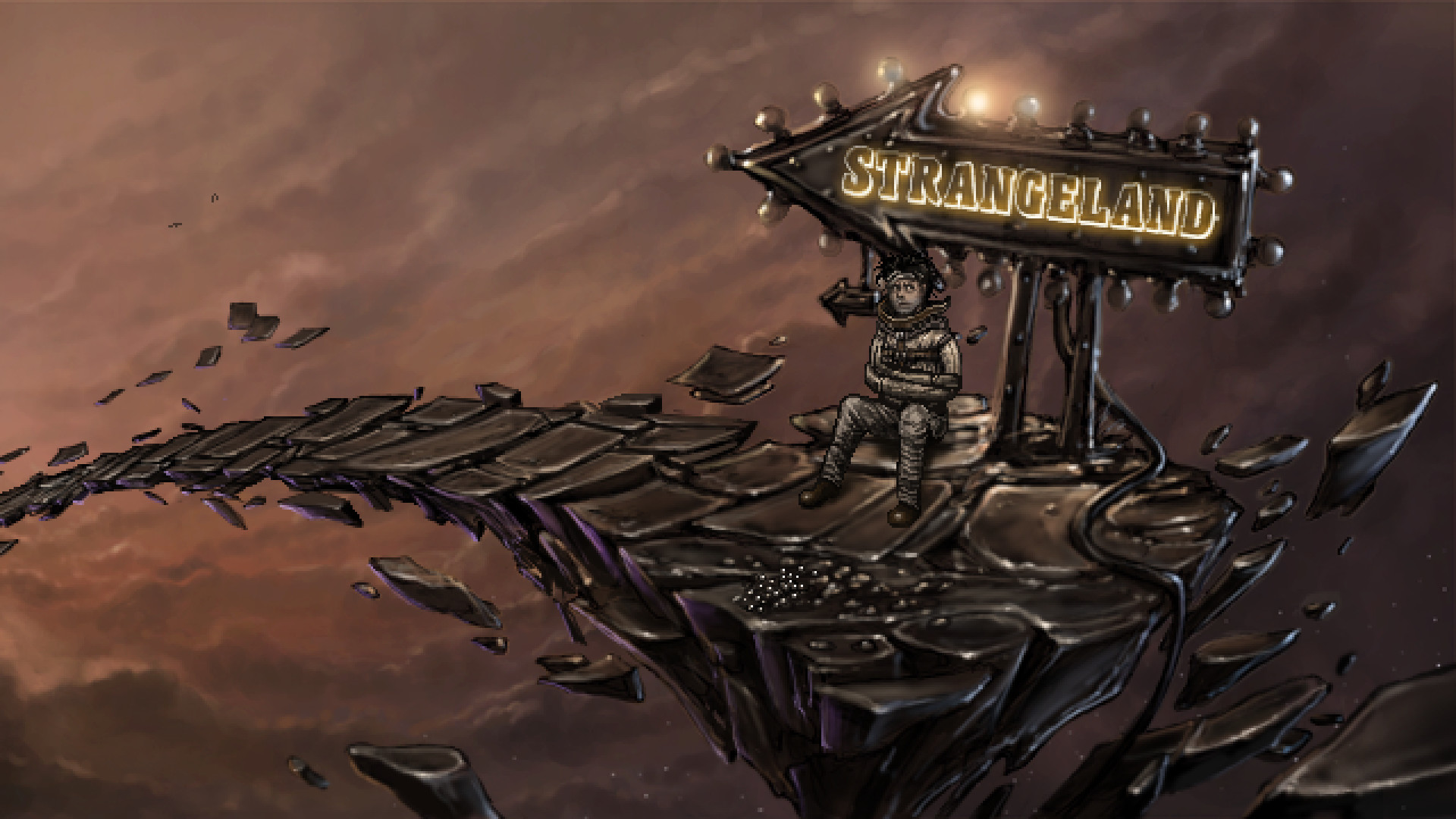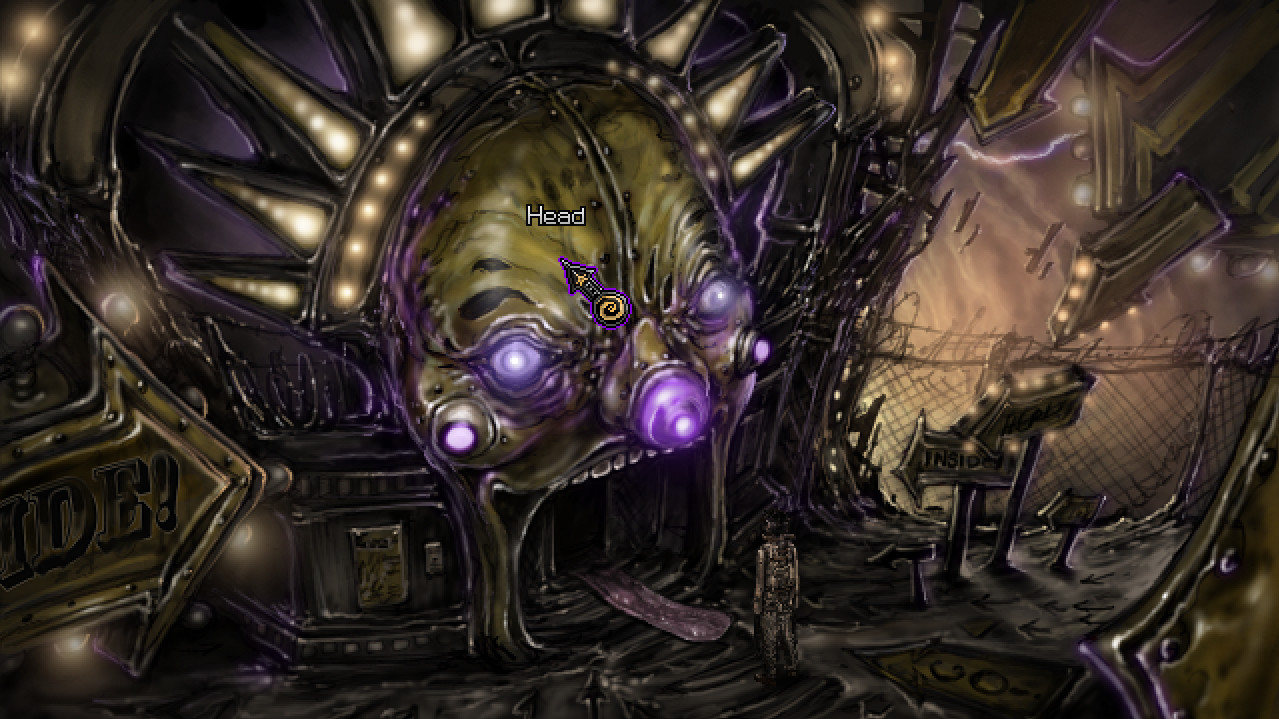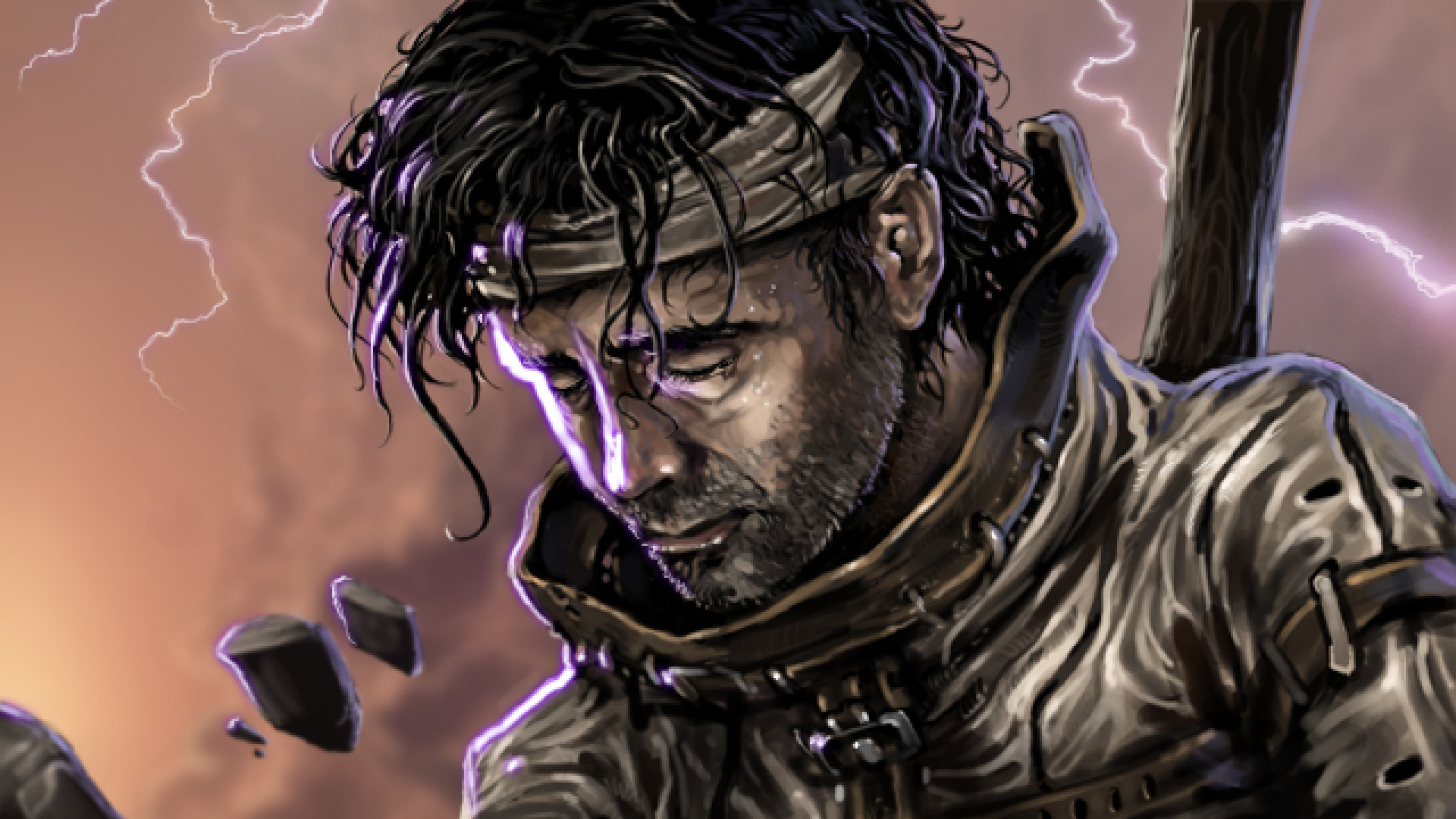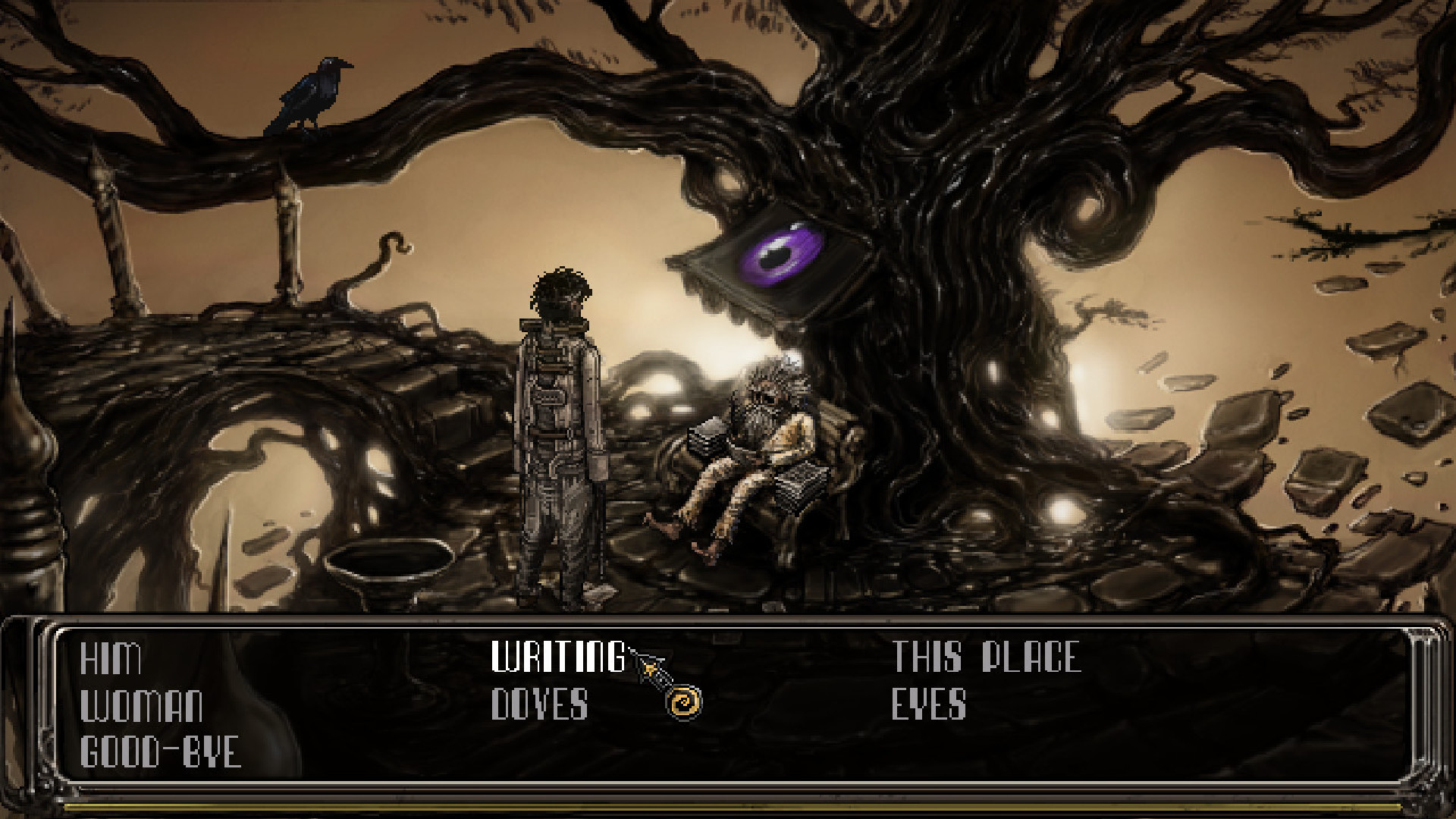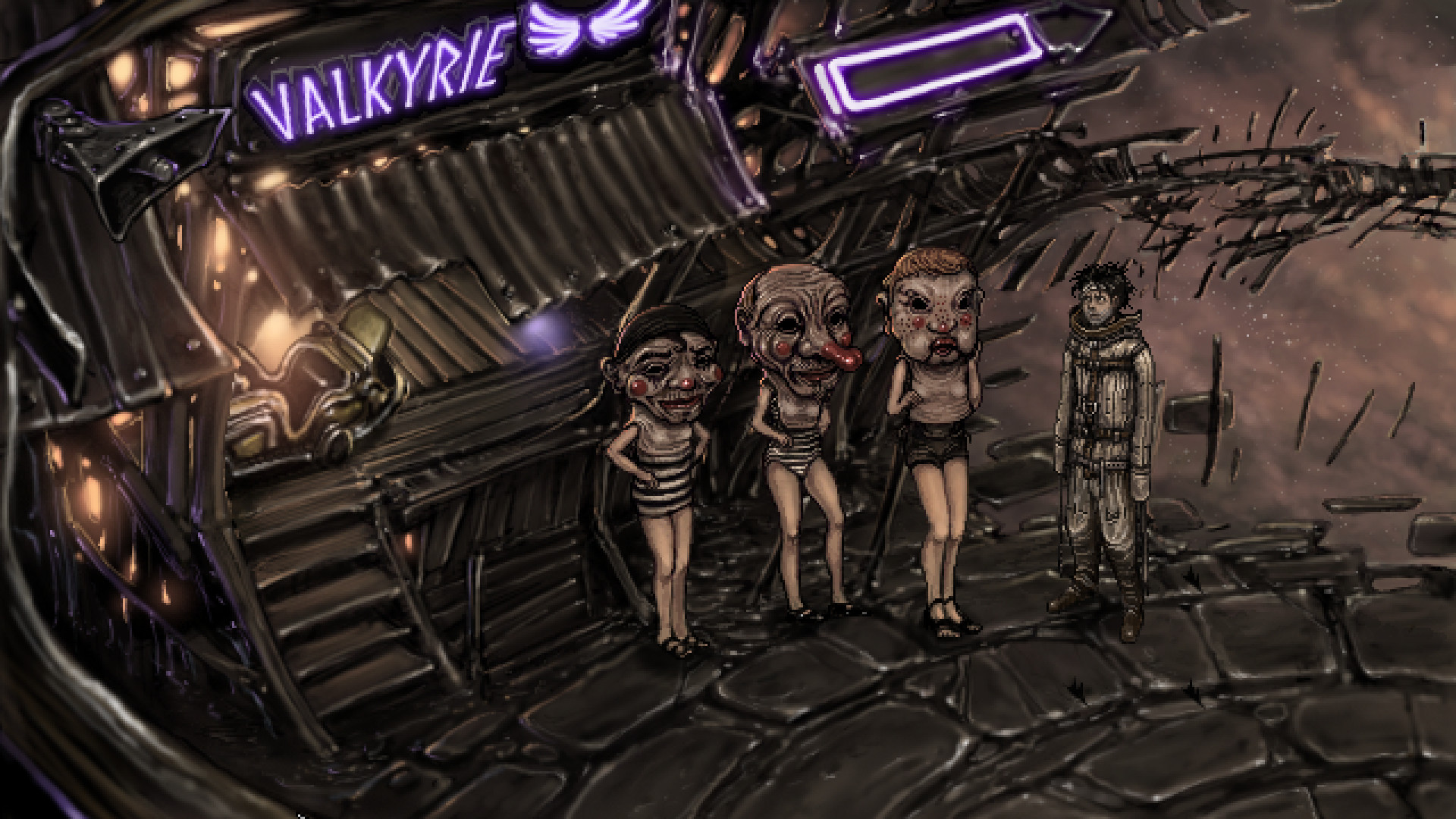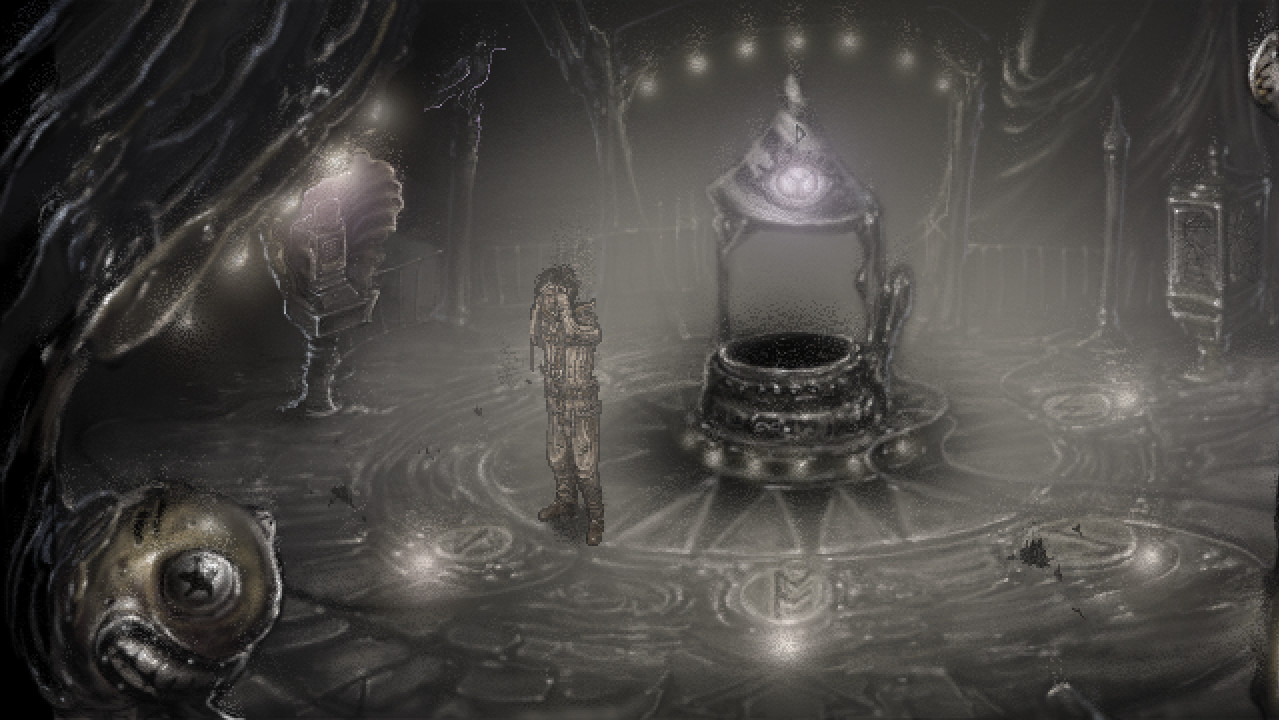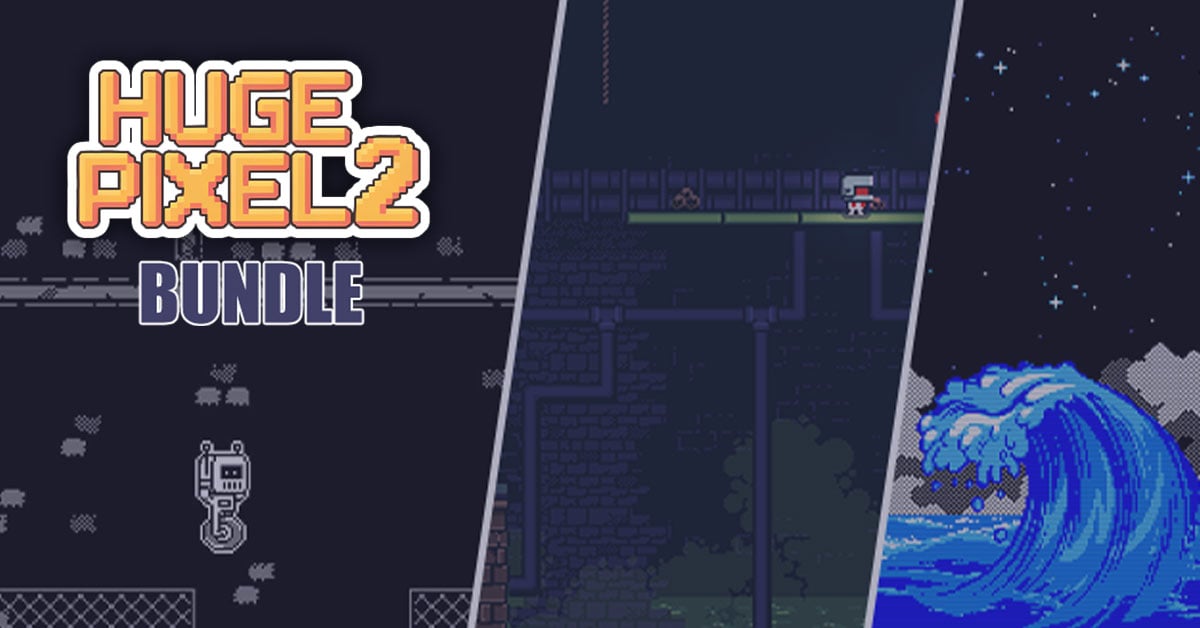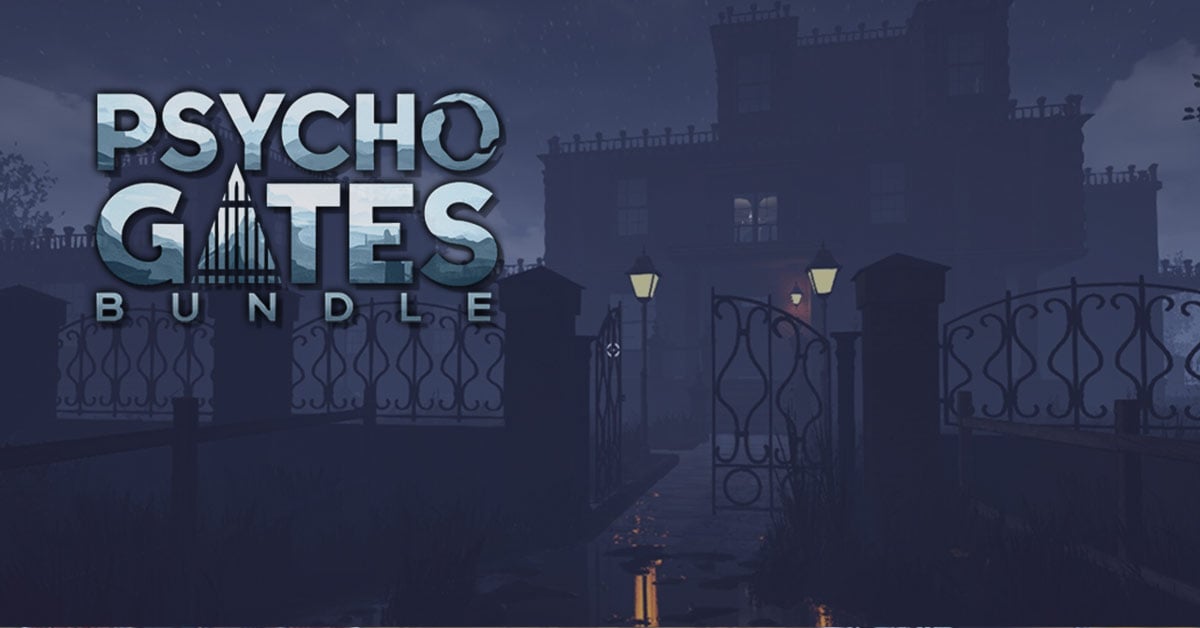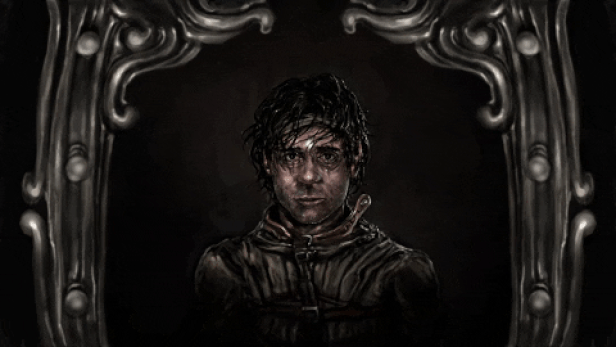
You awake in a nightmarish carnival and watch a golden-haired woman hurl herself down a bottomless well for your sake. You seek clues and help from jeering ravens, an eyeless scribe, a living furnace, a mismade mermaid, and many more who dwell within the park. All the while, a shadow shrieks from atop a towering roller-coaster, and you know that until you destroy this Dark Thing, the woman will keep jumping, falling, and dying, over and over again....

Strangeland is a classic point-and-click adventure that integrates a compelling narrative with engaging puzzles. For almost a decade, we've been working on a worthy successor to the fan-acclaimed Primordia, and we are proud, at long last, to share our second game.
Strangeland is a place like no other. Even in the real world, carnivals occupy a twilight territory between the fantastic and the mundane, the alien and the familiar. In their funhouse mirrors, their freaks, and their frauds, we see hideous and haunting reflections of ourselves, and we witness the wonder and horror of humanity in just a few frayed tents, peeling circus wagons, dingy booths, and run-down rides. Strangeland, of course, is most definitely not the real world. Indeed, unraveling the connections between this nightmare and the real world is the game's central mystery, and finding a way out is its central challenge.
As you explore Strangeland, you will need to gather otherworldly tools and win strange allies to overcome a daunting array of obstacles. Forge a blade from iron stolen from the jaws of a ravenous hound and hone it with wrath and grief; charm the eye out of a ten-legged teratoma; and ride a giant cicada to the edge of oblivion.... Amidst such madness, death itself has no grip on you, and you will wield that slippery immortality to gain an edge over your foes.
Navigating this domain of monsters and metaphors will require understanding its denizens and its enigmas. Unlike many adventure games that offer a linear experience and single-solution puzzles, Strangeland lets you pick your own way, your own approach, and your own meaning—one player might win a carnival game with sharpshooting, another by electrical engineering; one player might unravel a strange prophet's wordplay while another gathers visual clues scattered throughout the environment. Ultimately, Strangeland's story will be your story. You are not the audience; you are the player.
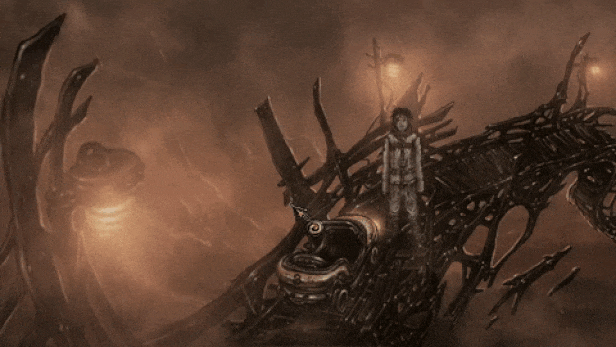

- Approximately five hours of gameplay, replayable thanks to different choices, different puzzle solutions, and different endings
- Breathtaking pixel art in twice Primordia's resolution (640x360—party like it's 1999!)
- Dozens of rooms to explore, with variant versions as the carnival grows ever more twisted
- An eccentric cast, including a sideshow freak, a telepathic starfish, an animatronic fortune-teller, and a trio of masqueraders
- Full, professional voice over and hours of original music
- A rich, thematic story about identity, loss, self-doubt, and redemption
- Integrated, in-character hint system (optional, of course)
- Hours of developer commentary and an "annotation mode" (providing on-screen explanations for the references woven throughout the game)
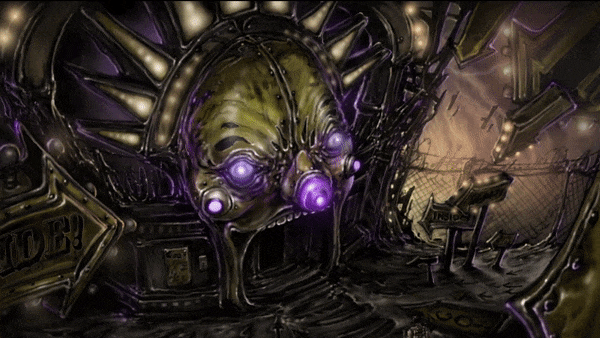

At Wormwood Studios, we make games out of love—love for the games we've spent our lifetimes playing, love for the games we ourselves create, and love for the players who have made all of those games possible. We know that players invest not just their money and time in the games they play, but also their hope and enthusiasm. And we want to make sure that players receive a rich return on that investment by creating games that provide not only a fun, challenging diversion for a few hours, but also lasting memories to keep for years.
We think the best way to achieve that with Strangeland is to adhere to the genius of the adventure genre: the marriage of challenging puzzles and thrilling exploration, on the one hand, with an engaging narrative, on the other. At the same time, we've tried to remove the punitive aspects of adventure games (deaths, dead ends, illogical puzzles, pixel hunting, backtracking, etc.). Within this framework, we add uncanny visuals, memorable characters, and thought-provoking themes. The result for Primordia was a game that has received thousands of positive player reviews, and we have refined our approach further with Strangeland. We hope it will not disappoint the players who have given us such great support and encouragement over the years! And we hope that it will find a place in the hearts of new players as well.
As the Earth completes another orbit (15 of them since Primordia got underway), we look back happily at all the love our games have gotten from fans and, somewhat more ruefully, at the sweat and effort that went into those games in the past twelve months.
Fallen Gods
Our foremost effort has been on https://store.steampowered.com/app/1641190/Fallen_Gods/\"" style="color:#bb86fc;text-decoration:none;">Fallen Gods , which is nearing completion! (Not a bad time to https://store.steampowered.com/app/1641190/Fallen_Gods/#game_area_purchase\"" style="color:#bb86fc;text-decoration:none;">wishlist it!) The team poured thousands of hours into its development this year, and the additions are too numerous to list. Significantly, we finished the game\'s hundreds of illustrations, hundreds of events (comprising tens of thousands of nodes), and hours of voice-over. We added tons of new animations, interfaces, sound effects, and other pixel art. Here\'s a peek at some of the new stuff!
[u]New Backgrounds and Combat Animations[/u]
[img src=\"https://cdn.cloudflare.steamstatic.com/steamcommunity/public/images/clans/38514961/068f1ab9b5df9c78c8691044559264f2054ee65c.png\"][/img]
[img src=\"https://cdn.cloudflare.steamstatic.com/steamcommunity/public/images/clans/38514961/e74f7cd51624c808a46d1f82e076ff4a7f75dcdd.jpg\"][/img]
[img src=\"https://cdn.cloudflare.steamstatic.com/steamcommunity/public/images/clans/38514961/103b7ed2dda432287dfab2cd39ad81109815b3a1.png\"][/img]
[img src=\"https://cdn.cloudflare.steamstatic.com/steamcommunity/public/images/clans/38514961/9adb357ec2f5995c782b00553f112b55f3ccbc9b.jpg\"][/img]
[u]Seed Menu[/u] (for replaying recent maps or trying seeds recommended by friends)
[img src=\"https://cdn.cloudflare.steamstatic.com/steamcommunity/public/images/clans/38514961/b0a5d0b3f80eaa2cb94fa85efdee7fa30ceff1a1.jpg\"][/img]
[u]Difficulty levels[/u]
[img src=\"https://cdn.cloudflare.steamstatic.com/steamcommunity/public/images/clans/38514961/b53894462db5458deb53fce0b7bde2391e19f567.jpg\"][/img]
[u]Zoomable world map[/u]
[img src=\"https://cdn.cloudflare.steamstatic.com/steamcommunity/public/images/clans/38514961/90eb449e64ec07c257525aed489647154945e775.jpg\"][/img]
[u]Scoreboard and achievements[/u]
[img src=\"https://cdn.cloudflare.steamstatic.com/steamcommunity/public/images/clans/38514961/a4041cd80f765c085c87323617d9f31d7b55f6de.png\"][/img]
[img src=\"https://cdn.cloudflare.steamstatic.com/steamcommunity/public/images/clans/38514961/300c564ce1406f746e638fc47c9108d9933008f3.jpg\"][/img]
[img src=\"https://cdn.cloudflare.steamstatic.com/steamcommunity/public/images/clans/38514961/55b72fefa54c580e23f85f20ebf69696498ba6dc.png\"][/img]
[u]Tutorial and integrated pop-up tips[/u]
[img src=\"https://cdn.cloudflare.steamstatic.com/steamcommunity/public/images/clans/38514961/7b90e1fa1d1f9fe794a1d96637b003a09faee34b.jpg\"][/img]
[u]Dynamic ending slides and after-action saga[/u]
[img src=\"https://cdn.cloudflare.steamstatic.com/steamcommunity/public/images/clans/38514961/5b3da460aa4d3a56f50c74f232549685941961a8.jpg\"][/img]
[img src=\"https://cdn.cloudflare.steamstatic.com/steamcommunity/public/images/clans/38514961/66bea62c9a720d4c2738fa37be5f33e4c9659cb1.jpg\"][/img]
Primordia and Strangeland
We still found hundreds of hours to put into our never-ending work on https://store.steampowered.com/app/227000/Primordia/\"" style="color:#bb86fc;text-decoration:none;">Primordia and https://store.steampowered.com/app/1369520/Strangeland/\"" style="color:#bb86fc;text-decoration:none;">Strangeland (both 70% off in the current Steam sale), fielding player questions, patching bugs, keeping the games compatible on modern systems, and working on translations and ports.
Primordia got three patches; Strangeland got two patches and was upgraded to a newer version of Adventure Game Studio. Having ported Primordia to the Switch a few years ago, James has been working ever since on getting Strangeland onto the Switch as well, and now has a working version that\'s playable start to finish. Strangeland also hit some big milestones as it approaches its five-year anniversary of release: 800 reviews (the best thing you can do to support indie devs is leave reviews!) and 50,000 copies sold. We\'re also still plugging away on the Spanish translation for Strangeland.
All told, it\'s been a great 2025, and we\'re looking forward to an exciting 2026, hopefully with the release of Fallen Gods to kick it off!
-Added a failsafe for an edge case issue regarding the mouse disappearing in the pool rooms.
I thought that issue was dead, apparently it's not, should be dead now. Happy birthday to Strangeland which was released on the 25th of May 2021!! Time flies!
-Fixed an issue with the French translation.
-Added a failsafe state.
Saves will not break not now, not ever.
-Added config tools for all OSES [Mac/Linux/Steamdeck]
-Compacted all translations into the same build.
-Moved Strangeland into a newer version of the engine.
Savegames won't break, because they can't be broken.
As 2025 begins, we wanted to take a moment to express our gratitude for all the incredible support we've received this year -- a big thank you to our amazing friends, fans, players, testers, translators, and teammates! Your enthusiasm and dedication have been crucial to everything we've accomplished. Here's a quick overview of some of our major achievements this year:
Strangeland
Late in 2024, the lead on Strangeland's Turkish translation reached out to me and James to let us know that he had gone back through and revised it, line by line, because he wanted the translation to do the game justice. He sent us a touching note, explaining how much video games had meant to him growing up, and adding:
This perspective is what makes meeting individuals like you such a joy for me. Learning about your journey as developers and reading about the experiences that shaped your creative vision has been profoundly moving. Its clear that your work isnt just about making games but about creating meaningful art that resonates with people on a deeper level.These kinds of messages mean so much... as I've said for years, the connections our creations make with our players is like calling out into the void and hearing a friendly voice answer back. Knowing that something we poured ourselves into matters to someone else is the whole reason for creating indie games.
Strangeland also got a first pass at a Spanish translation right at the end of the year, and we're hoping a final, integrated version will be ready by May.
These translations spring from the incredible generosity of our fans. I've enjoyed working with the translators on both Primordia and Strangeland to make sure the "voice," themes, and wordplay come through as much as possible -- a daunting task. There's always a fair bit of technical work for James in implementing them, and given this time commitment, these may be the last translations we do for a while. Still, it's satisfying to look back at the many translators and translations we've had the pleasure to work with and on over the past decade!
Primordia
The big update for 2024 was Marauder Film exercising the option we signed years ago, which gives Marauder the right to produce a Primordia movie. While this doesn't guarantee the film will get made, it's an exciting development! At the outset, I was very hesitant about agreeing to an adaptation of Primordia, as the world, characters, and story are so near and dear to my heart. Still, after seeing my teammates' enthusiasm and Bastiaans evident excitement for the project, I was persuaded. It's going to be interesting to see someone else's story and take on our creation, and the Marauder team seems excellent.
Meanwhile, James has continued to polish and support the game, the proverbial Man the All-Builder returning to perfect his creation, with a number of small bug fixes and improvements.
Fallen Gods
This year marked a significant milestone for Fallen Gods, our longest-running project, now approaching its 11th year! While we're not quite there yet, we're in spitting distance. The core content and engine are firmly in place, meaning 2024 was about refining and adding the finishing touches. That included features such as the tutorial, ending slides, world map, quest log, scoreboard, and run summaries. Art-wise, we completed a major UI overhaul; refined, replaced, or added dozens of illustrations; and added pixel art for new combat animations, diagonal movement sprites, and map details. On top of that, we expanded the game with more events, music tracks, sound effects, and voice-over nodes, while enhancing the ambient soundscape.
There's still a bit to go, but we're committed to ensuring Fallen Gods is as polished as possible before we cross the finish line. One nice thing about the development of the project is that we're not beholden to any timetable.
Website Overhaul
In collaboration with Nicolas Dekaise (developer of Enoch: Children of Fate ) and superfan James Boehme, we finally gave our website, www.WormwoodStudios.com , a much-needed overhaul. I'm not sure how much traffic developer websites even get these days, but we wanted to present our games in a cleaner, more attractive way.
Sundries
Finally, in Wormwood-adjacent news, the amazing Carbonflesh (which James has been working on forever) got its reveal and a demo, as did Infinity , the very first commercial game I ever worked on as a writer/designer (a quarter century ago!). And Iron Tower's Colony Ship , which I had the pleasure to consult on, had its final content patch, the culmination of many years of development. As anyone who's been through it knows, RPGs take a long, long time to make. I just hope that when Fallen Gods finally crosses the finish line, it's as great as these three games are!
- Mark
We've patched the Turkish translation of Strangeland!

Its been three years since we released Strangelandhow time flies! But in a way, it feels like a lifetime ago, and even longer since the death of my grandparents, the painful grain of sand that, with my friends help, we were able to turn into this pearl.
Weve heard from dozens of players about how the game helped them work through their own grief or despair, or gave them a grim laugh at its dark humor. It means a lot to know our little game had such an impact. Like our first creation Primordia, it has staying power: this past year we sold the most copies of any year yet. It goes to show how much it matters to have devoted and supporting fans like you all.
One of those fans is Eduardo, the amazing translator who brought Primordia to Spanish speakers, and hes nearing completion of his Strangeland translation. That translation, and the periodic bugfixes that James and I do, will probably be the last update for the game, but you never know... life is full of surprises (like Primordia getting optioned for a cinematic adaptation). All I know is, Im very happy with the story and characters of these two games, their alien worlds, and their theme of what it means to human. If nothing more comes of them, it will be enough.
Our next game, Fallen Gods is in the polishing phase now. Were taking our time with itover 10 years of development, a long incubation even for Wormwood Studios!because we want to make sure its the game our players deserve. But hopefully 2024 will be the year of its release.
Until the next milestone, adieu!
- Mark Y.

We are pleased to announce that Strangeland is 30% off for the Steam Scream Sale! When a mans own mind is a haunted house, he becomes a stranger to himself and sees in every mirror a monster staring back.
Like our first adventure Primordia, Strangeland is an homage to the classic point-and-clicks of the 1990s, a deeply personal story, and our effort to provide players with a rich, smooth gameplay experience.
Strangeland is a psychological horror game that explores despair and isolation, but it is ultimately a game about hope, love, and generosity, which is more important now than ever. We approached our development in that same spirit: hope that it finds a connection with you; love for our players and for the genre; and an effort to be generous in the polish, extra content, and ongoing support we put in the game.
With that in mind, if you play the game find that connection, we would love to hear it. We hope Strangeland is a treat, but if you hit any nasty tricks, technical snags, puzzle frustrations, or other issues, please let us know either in the forums on by email (mark@wormwoodstudios.com), and we will try to help you out as soon as possible.
Happy Halloween to all!

We are honored and grateful to announce the release of a Korean translation for Strangeland, courtesy of volunteer translator Hyewon. To opt into the translation go to your Steam Library, right-click on Strangeland, and select Properties. Within Properties, set the language to Korean.
This translation has presented extraordinary challenges. On a technical level, the engine in which the game is made, Adventure Game Studio does not easily support non-Roman-alphabet languages, and it required a great deal of work by our coder, James Spanos, to make the translation function. On a linguistic level, Strangeland's complicated wordplay and interwoven references required not only deft translation but thoughtful localization. Hyewon worked closely with the writer/designer Mark Yohalem to find a way to convey the text's original meaning in Korean.
This translation would not exist without Korean streamer Kimdoe, who featured Strangeland on a webpage entitled "I want this game to be translated in Korean." Hyewon found Strangeland through that website, and answered Kimdoe's call. After many months of tireless work and testing from Hyewon, James, and Mark, the translation is at last complete.
If you encounter any bugs or errors, please let us know in the Steam forum, or you can email us at mark@wormwoodstudios.com.
It is our hope that this translation becomes a bridge between Strangeland and a new group of players. And we are immensely thankful to Hyewon for building that bridge.
We are delighted to announce the release of a French translation of Strangeland! This volunteer translation represents the careful, wonderful work of Flavien Gaillard (who also translated Primordia) and a dedicated team of testers. Strangeland owes a great deal to French philosophy, literature, comics, and film, and it has received great support from the French gaming press (such as Canard PC) and French players. All of that makes us especially glad to make the game more accessible to a Francophone audience.
The translation covers any text that appears on the screen (such as menus, subtitles, signs, etc.), but the voice over remains in English. For those who speak English, you will no doubt notice that there have been various adjustments made to the text so that puzzles and wordplay make sense in French.
We hope you enjoy playing Strangeland as much as we have enjoyed sharing it with you. If you need any technical support, or catch any bugs with the translation, please let us know in the forum.
Fondly,
Wormwood Studios

One year ago today, we released our second adventure game, Strangeland! Its creation was an amazing, many-years-long journey that the three of us (Mark, James, and Vic) took together, and over the past year, it has been fantastic to welcome tens of thousands of players onto the next leg of that journey.
Our first year has seen a number of successes and significant milestones:
- Winning Aggie Awards, AGS Awards, AGOTY Awards, as well as many other prizes and nominations.
- Almost 450 user reviewers, and great user engagement throughout.
- Translations into German, Turkish, and Hungarian.
- Some truly amazing streams and video analyses of the game.
- Great coverage in print (e.g., the gaming magazine Level, which awarded us a perfect 100) and online (e.g., The Onion AV, Vice, etc.).
- Steam Deck, Linux, and MacOS ports.
- Nintendo Switch port.
- French, Spanish, Japanese, and Korean translations (hopefully!).
- Continued user support in the trademark Wormwood Studios fashion.
With love,
Wormwood Studios
-Fixed some issues on the German and Turkish translations.
-Fixed a general issue regarding changing translations.
Fixed various stuff on the Turkish translation, everything else is unchanged!

We were honored to see Strangeland take home four Adventure Game Studios Awards today:
Best Character Art
Best Puzzles
Best Voice Over
Best Programming
Moreover, our programmer/triumvir James Spanos was rightly honored with a Lifetime Achievement award. James not only single-handedly coded Primordia, Strangeland, and Until I Have You, he also helped code The Cat Lady and Mage's Initiation, and either ported or polished almost all of the games in the Wadjet Eye catalogue.
The last two awards are especially great given how rarely the programming of adventure games gets recognized, even though it is an indispensable part of an engaging player experience.
If you'd like to read about some of the award-winning coding feats James Spanos pulled off for Strangeland, check out his dev diary on the subject .
If you want to read about award-winning character art, you can read Victor Pflug's portion of our interview in Monstrum .
If you'd like to read more about the philosophy beyond our award-winning puzzles, you can read my (Mark's) dev diary on "The Power of Puzzles ."
Finally, if you want to see a behind-the-scenes look at the award-winning cast of voice actors, led by Abe Goldfarb and directed by Dave Gilbert, check out this YouTube playlist .
We're truly grateful for these awards, but as always, the thing that matters most is knowing that they are the product of player's expressing their support for the game, and we are always mindful of the many ways players have given that support -- sometimes vocally with Steam reviews, sometimes tangibly with fan crafts, and sometimes silently simply by playing our game. We love you.
-Various lines fixed on the Turkish translation!
-Fixed an issue with an exit in the Turkish translation!

We are honored and delighted to release a new build of Strangeland with full German and Turkish text throughout. This represents a monumental achievement by volunteers who have both the skill of translation and the broad knowledge needed to capture the games many references and allusions. We are immensely grateful to Yerel eviri for the Turkish translation and Jonas for the German translation.
I would also like to include a short acknowledgment of what these translations mean to me personally, as well as to James Spanos, our coder.
Strangeland owes a great debt to German culture, not only in its direct references to Wagners Ring Cycle and German-Norse mythology generally but also from the spiritual and intellectual impact on me from various works of literature written in German: Schillers Don Carlos, Manns The Magic Mountain, and Kafkas entire corpus. The themes of humanism and alienation that run through these works helped shape the philosophical backbone of both Strangeland and Primordia. In my growing up, the wounds of World War II were still raw enough in my parents and grandparents lives that German works were something of a taboo in my family, and I am grateful to have seen those wounds heal enough that my children and I enjoy the free flow of culture back and forth with Germany.
As for Turkish, I can only say that few countries have taken hold of my soul as Turkey did during the short stay there I had with my wife, many years ago. Strangeland is a palimpsest of meaning on top of meaning, and nowhere has that ever seemed so physically embodied to me as Istanbul: a city rich with life and deep with many cultures. We were welcomed into Turkey with universal hospitality, in every town and city we visited. I close my eyes, and Im transported back to that magical time. And, of course, no country welcomed our first game, Primordia, with quite such hospitality either: I dont know how or why, but the game received two glowing reviews in Turkish print magazines and many more online. The Turkish translation also means much to James, the Greek member of our trio. After Primordia was released, James had to serve his mandatory term in the Greek army. But Jameslike Primordias Horatiois a warrior for peace and friendship, and making this translation succeed was a must for him.
I go on about this because we are obviously in a moment of crisis in the world. Even though our games have a lot to say, we have never tried to make them about the moment. That is because in every moment, each of us must struggle to put love before hate, hope before despair, wisdom before folly, and grace before bitterness. In the end, we are small, fragile beings in an ever smaller, ever more fragile world. That world is surrounded by immense darkness and lifelessness, and the work of living is to see the light in each other, so that we do not turn this beautiful miracle of humanity and earth back into void and chaos.
These two translations are a gift to us at Wormwood Studios from generous, volunteer translators. We hope that they are also a gift to many players, so that our little game may provide a little light to others. You have provided much light for us.

The nominees for the 2021 Adventure Game Studio (AGS) Awards are in, and Strangeland has taken home 10 nominations, hitting all the major categories!
- Best Game Created with AGS
- Best Writing
- Best Gameplay
- Best Background Art
- Best Character Art
- Best Animation
- Best Music & Sound
- Best Voice Work
- Best Programming
- Best Puzzles
If you're interested in casting a vote, you'll need to register at the AGS forums, which can be a tricky process (the most elaborate anti-bot system this side of the Voight-Kampff test), but you can take do so here .

Cast your vote HERE for the Readers' Choice poll for the 2021 Aggies put on by AdventureGamers.com!
Obviously, we hope you'll vote for Strangeland in any categories where you feel it's deserving of recognition, but whatever games you vote for, community involvement is what keeps the adventure game genre alive, and Adventure Gamers is one of the longest-running sites devoted to the genre. There's no need to register, and voting is quick and painless!

We are floored by the nominations Strangeland received for the 2021 Aggie Awards , annually handed out by AdventureGamers.com, which I believe is the longest-running major adventure-game-focused website out there.
Strangeland was nominated for Best Traditional Adventure, Best Gameplay, Best Story, Best Art, Best Writing (Drama), Best Voice Acting, and Best Setting (the category that Primordia won in 2012). We are still awaiting the nominees for Best Adventure. There are many more nominees per category than back when Primordia came out, which may account for the larger number of nominations. Whatever the reason, we're very proud and grateful. In particular, it is nice to see nominations in such a wide variety of categories, recognizing the contributions from the whole team.
Back on Strangeland's release, Adventure Gamers described it thusly:
Strangeland is a surrealist, psychologic horror adventure that feels like it was drawn by H.R. Giger, designed by M.C. Escher, and written by Aeschylus. Its a polished, well-written, well-acted and intriguing interactive nightmare that is easily worth your timeif you can stomach the unrelenting depressive tone and disturbing imagery.We liked that so much we used it as one of the pull-quotes for Steam!
All the same, the kudos that matter the most to us come from players, whether reviews here (nearing 450!) or emails, and what is particularly nice about the Aggie awards is that the nominations reflect the community's involvement in the voting.
Finally, while the fez-wearing character is a bit much, it does offer an excuse to announce that Strangeland's Turkish fan translation is now complete and in testing!

The German indiegame magazine Welcome to Last Week named Strangeland the year's best point-and-click adventure!
By way of Google Translate, you too can can read what WTLW had to say about Strangeland , which they awarded a 10/10. At taste:
Strangeland is where my dreams come true. Not the dreams where I ride to Hogwarts on a witch's broomstick eating ice cream, but the kind of dreams where I'm confronted with my primal fears, my traumas. I am the stranger in a strange land crouching in the twilight between flesh and machine. ...Incidentally, WTLW's mission statement is fantastic, and I only wish I could read German well enough not to have to rely on machine translation:
Every sentence in Strangeland is in the right place. Playing it is like interpreting a poem. At the same time, it is an ancient image, thickly painted on a canvas, hiding many previous versions. And like a painting, there's more to the pixelated adventure than just looks. The slightly stiff animations are more than offset by the unique organo-mechanical look. Like in a cabinet of curiosities, I don't even know where to look first. The key was attention. Thinking along is rewarded more than in any other adventure. I will meditate on the dialogues many more times and explore the inspirations of Wormwood Studios.
[T]his indie game magazine is ... called Welcome To Last Week. Because research, intensive work and a sophisticated choice of words just take time. Because chasing after the hottest news is already happening everywhere. Because game journalism can do without rumors, leaks and sensations and deserves intensively researched texts. Because indie games are a wonderful form of expression and art in pop culture. We give them the attention they deserve.Naturally, we're biased in favor of anyone who likes Strangeland, but that seems like an excellent approach to writing about games. Such analysis may not offer a quick way to decide whether to buy a game or not, but the writing becomes its own art. As a developer I've learned a lot about how to make games by reading thoughtful dissections of the games that came before ours, and as a player, I've had my experience enriched by reading other's well-written reactions to the games I've loved.
We see ourselves as a culture magazine in the video game sector and not as a pure gaming platform. Barriers should be broken down in our texts. We want to enable everyone interested in art and culture to be able to understand our thoughts and experiences. Where others stop, we dig even deeper. We want to get to the bottom of the various gaming experiences, illuminate interesting topics, go into more detail on things that are easy to overlook or even obvious. We don't write tests according to imposed patterns, because tests are for food processors and vacuum cleaners. We look at the whole work, place it in a cultural, historical, emotional or artistic context and try to understand it. Pick out great idiosyncrasies to show you the cleverness of creative minds. We certainly don't always succeed in this, and by no means every video game experience is suitable for this. Sometimes it's a humorous approach that may reflect what has happened, sometimes it's more emotional. However, we do not claim to just scratch the surface or reproduce text modules.
Hopefully with our upcoming German-language translation, we will be able to reach more of WTLW's readership in 2022!

In another very gracious award, Strangeland was named one of the top indie games of 2021 by Indie Game Reviewer .
Combining a dark carnival atmosphere a la Bradburys Something Wicked This Way Comes with elements of psychological horror, Strangeland stands out for not holding the players hand, narratively speaking; its tale of a mysterious woman trapped by an evil force leaves lots open to interpretation.We're honored to appear alongside great games like Inscryption, Wildermyth, and more!
Not up for interpretation, however, are the games streamlined inventory puzzle design or its cinematic voice-acting, both of which make for a compelling experience that makes this one stand out far and above any other point-and-click adventures we came across this year.

We were delighted to see that Strangeland was chosen as one of the ten best puzzle games of 2021 by the Puzzle Lovers steam group (the list is in alphabetical order, confirming that we should have named the game Aadrvarkland), and was in fact the only point-and-click adventure to make the list.
As we talked about in our dev diary "The Power of Puzzles ," we have always viewed puzzles as an integral part of adventure games, perhaps the integral part, so it is a real honor to be selected by this group.

We were honored to read today that the New York Video Games Critics Circle (say that three times fast!) has nominated Strangeland for the Herman Melville Award for Best Writing in a Game.
Strangeland's daunting competitors include Psychonauts 2, Persona 5 Strikers, Resident Evil: Village, Marvel's Guardians of the Galaxy, and more. Never imagined we would be swimming with such whales!
To quote the man for whom the award is named, "I know not all that may be coming, but be it what it will, I'll go to it laughing."

We recently posted about Strangeland's nomination for various categories in the AGOTY Awards . We are now honored to announce that Strangeland won both Adventure Game of the Year and Best Screenplay! These rewards reflect the immense work of not just the core team, but also the many voice actors who brought the game's story to life and countless testers who helped draw forth what was best in the game and scrape away what did not work. And, of course, without the support of our fans, Strangeland would never have been noticed (or even made). Many thanks to all of you!
We were very pleased to see Strangeland was nominated in almost every category of the Adventure Game of the Year Awards: Adventure Game of the Year; Best Puzzles; Best Screenplay; Best Lines of Dialogue; and Best Soundtrack, Sound Effects and Dubbing! (Missed out only on Best Visual Art and Animation.) Hopefully we'll bring home some wins, and see some more nominations in Adventure Gamers' Aggies and Adventure Game Studios' AGS Awards!

2021 was a momentous year for Wormwood Studios, with major achievements on Strangeland, Primordia, and Fallen Gods.
Strangeland: Released, Translated, and Ported
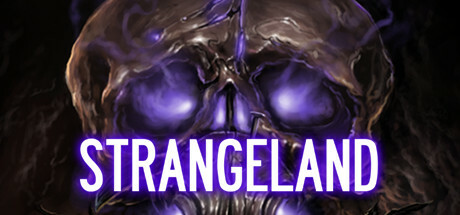
In May, we released Strangeland, our long-awaited adventure game follow-up to Primordia. We are grateful for the response so far. Strangeland is an intensely personal game. Using the psychological horror genre, we poured the tragedy, despair, hope, and redemption that weve experienced in our own lives into the vessel of a classic point-and-click adventure game. Originally conceived as part of a three-week jam, Strangeland consumed over four years of our lives into a full-length game, which many thousands of people have now played and enjoyed (and a few people have played and disliked!). The connection between players and the game is the most important thing about this work for us, so the reaction weve seen has been wonderful.
For the past year, we have been working very closely with a group of volunteer translators to make Strangeland available to non-English speakers. It is an exceedingly tricky game to translate, given the rich allusions, complicated wordplay and puns, and occasional language-based puzzles. Thanks to the hard work of Endre Linea, we were delighted to release the first translation, into Hungarian, just before the end of the year. We expect to release a German translation next, with Spanish and French close behind. Unfortunately, the Chinese, Japanese, Russian, and Polish translations are stalledbut perhaps we will be able to get them started again too in 2022!
Finally, we ported Strangeland to MacOS and Linux... and laid the foundation for some even more significant porting next year. Weve always wanted to offer native Mac and Linux builds, and were glad to be doing so now!
Primordia: Optioned, Translated, and Ported
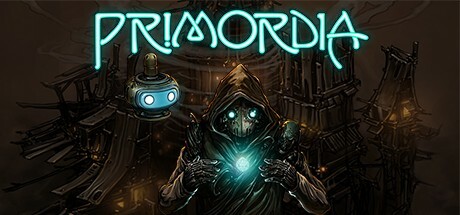
Rather unexpectedly, a film adaptation of Primordia that once seemed a pipedream appears to be progressing (with sufficient reality that we were paid a non-trivial option-extension fee). We cant share much publicly about it, and its always safest to assume that these things wont pan out, but its a serious team working on the film project. It just speaks to the strength of the community that you alll have built around Primordia that our little old game continues to attract such attention. Next year will mark a decade since our game was released, and we celebrated our 300,000th copy sold this year.
More down to earth, Primordia received an Italian translation this year, courtesy of volunteer translator Marco de Vivoadding to the existing official French, Spanish, and German translations and unofficial Russian one. As with Strangeland, we have had some false starts into other languages this year (and in years past), but we plan to keep trying to bring Primordia to new languages and new audiences as the years go by. Recently, Russian and Turkish translators approached us, so well see where that goes.
We also achieved our long-running goal of releasing native Linux and MacOS ports of Primordia. As with Strangeland, we made a more significant port this year, too, which we should be able to announce early next year. Needless to say, were very excited about it.
Fallen Gods: Significant Further Development
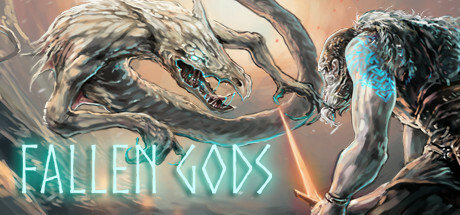
Fallen Gods is now many, many years into development. Its progress is slow, but steady, and has been significant on a number of fronts this yearsignificant enough that we finally published the games Steam page (and were grateful for the thousands of wishlist additions that have followed).
Art-wise, we added dozens of new illustrations to the game (every event in the game is accompanied by an illustration), new combat sprites and animations, new character portraits with varying moods, updated mountain and marsh tilesets, and various small visual enhancements across the board. Audio-wise, we added dozens of new voiceovers for events (the first text node in each event is narrated), dozens of new musical sketches, and numerous sound effects.
The most significant advances have been design-wise. Fallen Gods is an open-world, procedurally generated, non-linear, narrative, rogue-lite RPG. While other games (including its forebear, the board game Barbarian Prince) have had many of these features, this is the first game Ive developed that did not have a predefined structure. One of the greatest challenges has been ensuring that the game still has clear direction, strong pacing, and satisfying progression, along with a high level of challenge. As more of the game came together, weve revised a number of systems, including how dungeons are traversed, how information is doled out to the player, and how the economy works. We also introduced some additional victory conditions. Im relatively confident that the design is now in the refinement rather than reworking stage, which should help us fill out the rest of the content. Were hoping to release Fallen Gods in 2022. The major challenge is simply that the older I get, the less time and energy I seem to have, which has slowed the design/writing down.
My hope is that in the next month or so, we will finally be able to share a lengthy gameplay video showing a run through the game. There is still quite a bit of placeholder content, but it will at least be satisfactory proof of life!
Conclusion
As always, we want to end by thanking all of you, who have made our dreams of game development possible. Youre awesome, and we are grateful for your support. We hope that in 2022 we are able to continue sharing our best work with you, continue enhancing our existing games, and continue participating this wonderful community that youve helped create. Happy New Year!Merry Christmas! We are pleased to announce the first (of many) Strangeland translations: Hungarian! This is an entirely new language from any of the translations we did for Primordia, and it presented a variety of technical challenges. But thanks to the amazing translator Endre Linea, we not only overcame those challenges but also created a foundation for the next translations to come. We hope to start the new year with German, and French and Spanish translations are also in the queue. So far, attempts at Japanese, Korean, Russian, and Polish have not made as much progress, but we are hopeful that someday we will have those, too. Much love to you all, and especially to whatever Hungarian players we are now able to reach!
Boldog Karcsonyt! rmmel rntjuk le a leplet a Strangeland magyar fordtsrl! Ez egy teljesen j nyelv a Primordihoz kszlt lokalizcikhoz kpest, s szmos technikai kihvst is jelentett a megvalstsa. De warg kivl segtsgvel nemcsak legyztk ezeket az akadlyokat, hanem el is ksztettk a terepet a tbbi fordts szmra. Remljk, hogy az j vet a nmetre tltetett jtkkal kezdhetjk, utna pedig a francia s spanyol kvetkezik. A japn, koreai, orosz s lengyel prblkozsok eddig mg nem jrtak kzzel foghat eredmnnyel, de remljk, hogy egy nap ezeket is megvalsthatjuk. dvzlnk mindannyitokat, klnsen azokat a magyar jtkosokat, akikhez gy egy lpssel kzelebb kerlhettnk!

Season's greetings! We are delighted to celebrate the end of Strangeland's first year with all of you!
Like our first adventure Primordia, Strangeland is an homage to the classic point-and-clicks of the 1990s, a deeply personal story, and our effort to provide players with a rich, smooth gameplay experience.
While Strangeland is a psychological horror game that explores despair and isolation, it is ultimately a game about hope, love, and generosity, fitting for the holiday season and the coming new year. We approached our development in that same spirit: hope that it finds a connection with you; love for our players and for the genre; and an effort to be generous in the polish, extra content, and ongoing support we put in the game.
With that in mind, if you play the game find that connection, we would love to hear it. But if you hit any technical snags, puzzle frustrations, or other issues, please let us know either in the forums on by email (mark@wormwoodstudios.com), and we will try to help you out as soon as possible.
Happy holidays to all!
-Small fix to mac regarding a torch bug. [Special thanks to jam!]
While I am always anxious about imposing on our players and I am always loath to solicit a gift, I also want to help Strangeland's themes of redemption and hope reach as many players as possible. We have been fortunate to find that the game has touched hundreds of players, and perhaps many thousands more who have not shared their reactions with us.
With that in mind, we humbly ask that you consider nominating Strangeland for a Steam award, to the extent you think it deserving. While some categories are obviously inapplicable, we ask that you consider it for Outstanding Story Rich Game and Outstanding Visual Style.
In the meanwhile, we hope that you are well in this season of giving thanks for the earth's bounty, and connecting with friends and family. Though the days are short and the nights long, may your lives be full of light.
We are delighted to offer Strangeland at its lowest-ever price, and we hope that many new players will experience this surreal and horrifying journey into the psyche of a haunted mind. Classic point-and-click adventures offer their share of tricks and treats alike, but we hope that with the built-in hint system, autosave, and lack of permanent failure states, there won't be any frustrations!
In the spirit of the holidays, you might check out "Why Horror?" -- a development update explaining the philosophy behind our game's genre. You can also check out a recent interview with Strangeland's team in Monstrum, a leading horror journal, here .
Enjoy the game! If you have any technical questions or need hints, or just want to discuss themes and images, stop by the forums, where all of us developers are very active!
Happy Halloween!

Strangeland's writer Mark Yohalem and artist Victor Pflug were recently interviewed in the magazine Monstrum about their influences and their interest in horror. (The interview was conduct by the prolific Jeffrey Klaehn.)
Here's a taste:
There is the Lovecraft clich that fear is the oldest and strongest emotion. I dont know if thats true, but I think horror will always be with us. The Greeks taught that our very efforts to impose control over the things we fear simply hastens us toward our doom. All of human history is an effort to control primordial horrors, but our war to end all wars yielded a hecatomb like no other, our green revolution against famine created the specter of an unnaturally brittle food supply, and our miracle cures have bred prodigiously resistant diseases. I truly believe our striving is noble and has generally made the world a better place, but the lesson here is that we cannot conquer the things we fear; they are protean and eternal; hubris summons nemesis. So we will never be free of these terrors.You can read the whole article, and the rest of the excellent fourth issue of Monstrum, here .
That means we need horror. Horror is a way of manifesting our primordial dreads (including the fear of powerlessness and loss of control) in forms that we can wrestle with. Just as nightmares help us process fears while were asleep, horror helps us process those fears while were awake. As long as life is a chaotic mess that resolves only in death, we will turn to horror to help us survive.
September is Suicide Prevention Month, this week is National Suicide Prevention Week, and September 10 is World Suicide Prevention Day. Given the personal experiences that led to Strangelands creation, and the themes the game explores, we thought it appropriate to post something about suicide prevention.
The National Suicide Prevention Lifeline explains that individuals are more likely to feel less depressed, less suicidal, less overwhelmed, and more hopeful after speaking to someone who listens without judgment. Each of us has an internal voice that sits in harsh judgment; for some of us, that voice is louder; for some of us, it is so loud that it is the only internal voice we ever hear. And when fear of judgment stops us from speaking with others, then that harsh spirit inside is also the only one listening. It becomes easy to get trapped in an internal conversation of cruel self-judgment. Strangeland is the story of a protagonist caught in that trap. As the NSPL explains, one way we can help others find their way out is to provide a sympathetic ear and an open heart. We can offer a light to those lost in that darkness simply by ask[ing] after them in a caring way.
If there is a single message we hope reaches Strangelands players it is that, even if we dont know it, the light of love is shining on us from many directions, though it is sometimes hard to see, and thatsimultaneouslyeven in our darkest hours, we are a light of love shining on others. Each of us is a person worthy of love, whose love is worthwhile to others. But those of us who most need to hear that are those who hear it least often. And, too often, we dont hear them, either.
According to the American Association of Suicidology , suicide steals away tens of thousand of people a year, with no demographic spared, though its toll is worst among older men. The pain radiates out through a web of connectionsconnections that might have seemed invisible to one lost in despair, but which were there all the same. And beyond those lost to suicide, or who lose another to suicide, are the many who are afflicted by it in other ways, by attempting or merely imagining the possibility of suicide. The AAS indicates that more than 1 in 20 people may suffer from suicidal ideations each year. This means it is very probable that all of us know someone who is suffering, likely silently and secretly, from this agony.
It is a truism that the internet and video games can bring out the worst in people. But truisms arent the same thing as truth, and this one is at best a partial and distorted view. The other part is that the internet and games are also the means by which communities and relationships form. I have gained deep, lasting friendships through making, playing, and discussing games online, and have received many kindnesses and much love through these media. The intensely meaningful, positive, and often personal feelings that so many have shared with us about Primordia and Strangeland have been a light when things seem dark, and a balm for lifelong wounds that never fully heal.
This month should serve as a reminder of the opportunities we have to show love and kindness to otherswhether at the bus stop or on Steam, whether in our households or on Twitter. Every one of us has great capacity to lift up and comfort our fellow human beings, and they in turn hold a wealth of happiness for us. We wont always know when a small gesture, a kind word, a sympathetic ear, or just a friendly smile will have an outsized effect on someone in pain and in need. To err on the side of kindness is no error at all.
Finally, if you are suffering from suicidal thoughts, please remember that you are a light to many, and you are worthy of love and life. There are free resources that can help, and there is only strength, not shame, in seeking out such assistance. The resources below are based in the United States, but wherever you live, there are those who can help.
With love,
Mark, James, and Victor
Wormwood Studios
[u]National Suicide Prevention Lifeline[/u]
1 (800) 273-8255 [1-800-273-TALK]
https://suicidepreventionlifeline.org/
[u]American Foundation for the Prevention of Suicide[/u]
https://afsp.org/suicide-prevention-resources
[u]Suicide Awareness Voice of Education (SAVE)[/u]
https://save.org/
[REPOSTED]
-Fixed a bug reported by Jvie here:
https://steamcommunity.com/app/1369520/discussions/0/3033725780712121643/
-Fixed a segmentation fault
That's pretty much it!
September is Suicide Prevention Month, this week is National Suicide Prevention Week, and September 10 is World Suicide Prevention Day. Given the personal experiences that led to Strangelands creation, and the themes the game explores, we thought it appropriate to post something about suicide prevention.
The National Suicide Prevention Lifeline explains that individuals are more likely to feel less depressed, less suicidal, less overwhelmed, and more hopeful after speaking to someone who listens without judgment. Each of us has an internal voice that sits in harsh judgment; for some of us, that voice is louder; for some of us, it is so loud that it is the only internal voice we ever hear. And when fear of judgment stops us from speaking with others, then that harsh spirit inside is also the only one listening. It becomes easy to get trapped in an internal conversation of cruel self-judgment. Strangeland is the story of a protagonist caught in that trap. As the NSPL explains, one way we can help others find their way out is to provide a sympathetic ear and an open heart. We can offer a light to those lost in that darkness simply by ask[ing] after them in a caring way.
If there is a single message we hope reaches Strangelands players it is that, even if we dont know it, the light of love is shining on us from many directions, though it is sometimes hard to see, and thatsimultaneouslyeven in our darkest hours, we are a light of love shining on others. Each of us is a person worthy of love, whose love is worthwhile to others. But those of us who most need to hear that are those who hear it least often. And, too often, we dont hear them, either.
According to the American Association of Suicidology , suicide steals away tens of thousand of people a year, with no demographic spared, though its toll is worst among older men. The pain radiates out through a web of connectionsconnections that might have seemed invisible to one lost in despair, but which were there all the same. And beyond those lost to suicide, or who lose another to suicide, are the many who are afflicted by it in other ways, by attempting or merely imagining the possibility of suicide. The AAS indicates that more than 1 in 20 people may suffer from suicidal ideations each year. This means it is very probable that all of us know someone who is suffering, likely silently and secretly, from this agony.
It is a truism that the internet and video games can bring out the worst in people. But truisms arent the same thing as truth, and this one is at best a partial and distorted view. The other part is that the internet and games are also the means by which communities and relationships form. I have gained deep, lasting friendships through making, playing, and discussing games online, and have received many kindnesses and much love through these media. The intensely meaningful, positive, and often personal feelings that so many have shared with us about Primordia and Strangeland have been a light when things seem dark, and a balm for lifelong wounds that never fully heal.
This month should serve as a reminder of the opportunities we have to show love and kindness to otherswhether at the bus stop or on Steam, whether in our households or on Twitter. Every one of us has great capacity to lift up and comfort our fellow human beings, and they in turn hold a wealth of happiness for us. We wont always know when a small gesture, a kind word, a sympathetic ear, or just a friendly smile will have an outsized effect on someone in pain and in need. To err on the side of kindness is no error at all.
Finally, if you are suffering from suicidal thoughts, please remember that you are a light to many, and you are worthy of love and life. There are free resources that can help, and there is only strength, not shame, in seeking out such assistance. The resources below are based in the United States, but wherever you live, there are those who can help.
With love,
Mark, James, and Victor
Wormwood Studios
[u]National Suicide Prevention Lifeline[/u]
1 (800) 273-8255 [1-800-273-TALK]
https://suicidepreventionlifeline.org/
[u]American Foundation for the Prevention of Suicide[/u]
https://afsp.org/suicide-prevention-resources
[u]Suicide Awareness Voice of Education (SAVE)[/u]
https://save.org/
Following up on our native Linux release of Strangeland, we are very pleased to release a native MacOS build. While we have worked hard to ensure a bug-free release, the reality is that we are a Windows developer primarily, so it's possible that early players may encounter some issue. If so, please let us know (either with a comment here or a message board post), and we will work quickly to address whatever problem you're having. Hopefully there will be no snags, and even more hopefully, Mac players will enjoy our game!

There was an issue reproduced by Dodger, where if you timed it right, you could get a seg fault. It really took a good amount of time to reproduce, but I've pushed a fix.
Last week I posted a few video analyses of Strangeland, and this week I wanted to follow up by posting a few videos of livestreams and Let's Plays from CohhCarnage, Mostly Walking, Keith Ballard, Bowie (Chinese), and Staszek iGRAszkowski (Polish).
One of the incredible pleasures that has followed Strangeland's release has been the opportunity to watch Twitch streams of folks playing our game. Back in Primordia's day, streams were much less common, so we only were able to watch the after-the-fact Let's Play videos on YouTube. James, Vic, and I have loved not just watching streamers react to the game, but also watching their audiences contribute to, and feed off of, the streamers' enjoyment. The different perspectives and comments have been a treasure. It's also awesome to see people work through puzzles, speculate about symbols, decipher clues, and catch references in real-time.
We've enjoyed all of them, and we could probably post five dozen, rather than just five. But to be reasonable, here are just a few to check out -- whether you're interested in the game and want to see more before buying, or whether you simply enjoying watching streams and LPs for their own sake. (All of these have follow-up videos, which no doubt you can find on YouTube with your adventure-game-puzzle-solving skills!)
CohhCarnage
Mostly Walking / Day9TV
Keith Ballard
Bowie (Chinese)
Staszek iGRAszkowski (Polish)
As ever, we're grateful to the streamers, LPers, and players who have helped spread the word about our game!
Details:
-Fixed a minor bug with Save detection.
-Prepared things for Translations.
Some of the most interesting reviews of Strangelandand review doesnt really do justice to them, theyre more analyses or dissectionsare not published on gaming websites, but posted to YouTube. If youre on the fence about trying our game, or if youve played it and (like me) enjoy watching a couple thoughtful people break down a game in all its aspects, you might enjoy watching these videos from PushingUpRoses and Grimbeard.
PushingUpRoses
Grimbeard
Many of the development posts about Strangeland have focused on the personal experiences and values that shaped the game. In todays post, I want to talk about a more practical side of game development: how I was able to make the 25-year-old Adventure Game Studio (AGS) engine bring Victors art and audio and Marks design and writing to life. Some of what Im going to discuss are features that players of Strangeland will see, hear, and notice. But much of the work was subtle or even invisible because one of the most important things is for the software to get out of the way while the player is experiencing the game. Im as proud of these accomplishments as I am of everything else that went into the game, and for those who are interested in the technical aspects of making games, I hope this will provide some inspiration and insight.
Audio Engine
Many players have said very kind things about the amazing soundscape that Vic and our voice actors created. But this was only possible by completely overhauling AGSs default audio engine.
As anyone who has bought the soundtrack or listened carefully has noticed, Strangeland has a huge number of relatively short musical tracks. The music changes from exploration to dialogue, and even sometimes within dialogue. Because of frequently changing musical tracks, we needed crossfading to avoid unpleasant cuts from one track to the next. But AGS did not support custom crossfading; instead, you would have to use one of AGSs limited sound channels.
The problem is, Strangeland uses a very large number of sound layers to achieve its rich soundscape: music, ambient sound effects, active sound effects, dialogue, etc. can all be playing at the same time. When I dedicated a channel to crossfading, the result was that some other audio (perhaps a sound effect, perhaps a voice over line) could get cut off. It was impossible to predict when this would happen.
The easy solution would be to cheapen the soundscape. But with a project so personally important to Victor and Mark and myself, cheap fixes were not fixes at all.
So I took the hard solution: finding and integrating a cross-platform audio engine. I settled on SDL Mixer and after about a week of work, I managed to get it working in AGS.
Around the same time, I was playing the game Celeste, and I was very impressed by its use of a low-pass filter. It struck me that we could use that to good effect in Strangeland, particularly in combination with a blur visual effect when the inventory is open. It actually took me about a month to get the filter working right. Its a small thing that players may not notice. The point is not for them to notice it, but to feel it, and I think it adds to the feeling of immersion and even dream-like quality of Strangeland. To my knowledge, its the first use of a low-pass filter in any AGS game. You can hear for yourself here:
Savegame System
By default, AGS saves games by dumping all of the system memory associated with the game into a file, and restores games by moving that data back into memory. In a way, this is a very reliable system because it makes sure that nothing gets lost in saving and restoring. But it has serious flaws.
The worst flaw, in my opinion, is that if you update the game in a way that changes how it handles memory, old saved games will break. As a result, most AGS games on Steam are only rarely updated, and the updates tend to be fairly minor (to avoid breaking saved games). We did a few small patches and two large updates to Primordia, and when we did the large updates, many players were frustrated because even though the game was now much better, they had to start from scratch. I spent a lot of time making custom saves for these players so they could resume where they left off.
But this leads to the second problem: AGS games actually use a lot of system memory. Even if they look like adventure games from the 1991, they use RAM much more liberally. Saved games for Primordia, Unavowed, or Technobabylon can be as large as 20 megabytes. This makes them a pain to send or backup. During development, that means its a hassle for testers to send me saved games when they encounter a bug.
That isnt the only problem with large save files, though. When saves get that large, even on a fast hard-drive there is generally a small FPS drop when you save. Because we wanted an autosave for Strangeland, that meant that every time you entered a room, the fading effect and audio would skip slightly. My dear neurotic friend Mark sent me roughly 1,000 emails complaining about this.
And the problem got even worse for Strangeland. As you know, Vic does many very large, even full-screen animations. Loading these into memory is not instantaneous, which means that if we load the animation in real-time, there can be a very slight FPS drop there, too. Naturally, Mark complained about this as well. I solved the problem by precaching the animations when the game loads, where the player will not notice a short hang. But now, [i]Strangeland[i]s memory usage increased even more -- which meant that the save files were even larger, which meant that the FPS drop on autosave was even worse.
Cant you just make a custom save game system? Mark asked.
The answer is of course yes, but at what effort? But, as stated, for Strangeland, I felt I could not spare any effort. So, now we have an elaborate savegame system. To begin with, each save file is only 30 kb, even though they store over 5000 variables that include character attributes (position, animation frame, etc.), inventory items, progress variables, UIs, dialogue options, what sound effects are playing, etc. This was a size reduction of approximately 99.5% because what is not saved is things like the graphic or audio data that the game has in system memory. That means saving and loading is instantaneous, and the autosave FPS drop was cured. On top of that, the game auto-numbers your saves, creates small screenshots to use in the savegame UI, and generally manages the save files in a more organized way than AGS normally would.

But setting aside these aspects of the player experience, the other critical difference is that the saved games dont break when we upgrade Strangeland. In the first month of release, weve patched the game ten times, and its essentially invisible to players. Small bugs dont have to accumulate for months for one grand saved-game-breaking update. We can squash them immediately. And we can do that even though six of the patches weve pushed wouldve broken saves without this custom engine.
Developing, and above all QA-testing, the savegame system took a long time because you have to be very careful to make sure you have saved everything necessary; its not like the default system that does it automatically. And probably no one who plays Strangeland thinks, Wow, what a savegame system! The files are so small! A savegame system should be something the player doesnt think about at all -- and thanks to a lot of hard work, thats the way it is for Strangeland.
Reflections
What if mirrors were a major theme of the game? my idealistic friend Mark thinks. Mirrors within mirrors! Shattered mirrors! Funhouse mirrors! Mirrors that reflect only a partial image and not the real thing! A reflecting pool in a hall of mirrors! Mark sometimes claims that he once was a programmer, but his notions suggest otherwise. And, of course, Victors love of the game Weird Dreams meant that it was inevitable we would have a hall of mirrors in this carnival.
Sometimes, the nightmare in the carnival is the nightmare of working with Mark and Vic.
Mirror effects should not be possible in AGS. AGS doesnt support even basic affine transformations, only scaling effects. Even basic rotation requires custom parts to work.

Since Vic draws nothing straight, the mirrors were never going to be a matter of simply flipping a sprite. Instead, everything required simultaneous skewing, rotating, and scaling (as well as flipping). A subtle blur effect to mask the imperfections. Different mirrors at different angles required different formulas. All of this has to be done in real-time, and it has to be done efficiently enough to prevent a catastrophic framerate drop.
Okay, but what if there were, like, tear-drops falling from the roof, making the reflecting pool ripple...?
Yes, my friends Vic and Mark, I will give you even that. No effort spared.
Because AGS cannot push this into the GPU, all of these effects are coded through a software renderer. But, thankfully, they all work.
Text Gradient
Primordia used solid-color, blocky text that evoked the feel of an old-fashioned computer terminal. But the dreamlike environment of Strangeland required a different look, I believed. And from playing Kathy Rain and Whispers of a Machine, I knew just the thing: a color gradient within the text.
I believe that those games use a plugin that enables bitmap fonts, but for Strangeland we took a different approach. The games entire projection of text and messages is printed upon a 640x360 graphic image. (In some engines, this step might be easy, but not in AGS; it required custom speech text functions and data pooling.) The gradient is applied by starting from the bottom at color X and then, every Y pixels, it moves towards black by Z. Z is defined by the total individual height of each sentence projected into the screen. Color X is user-defined and Y is also user-defined, arbitrarily selected, so these effects can be adjusted by the player in the options menu.
After setting up the basic function, I spent a lot of time ensuring that readability was not impaired. The end result distinguishes us from the appearance of a lot of AGS games, while also reinforcing the unique feel of Strangelands setting.
Outlines
AGS has no built-in function for outlining a sprite or interface element, so whenever you see an outlining effect in an AGS game, its been done manually -- mostly by having two versions of the sprite (one with an outline, one without). (There was, in 2003, an outline plugin for AGS, but it worked only on inventory items.)

Strangeland uses outlining so extensively, that approach was not a viable option. So, instead, I set up a system for real-time, dynamic outlining. We use it for the mouse cursor (such as when it is over a hotspot), for items in the inventory, and for UIs. These visuals cues make the interface clearer to players, but they also add a dynamism to elements that would otherwise seem static.
Visual Effects
The most obvious of these are the effects that occur when the Dark Thing screeches or attacks. I wanted it to feel as if reality was fracturing or even collapsing during these sequences. For the screeches, I created an effect that looks almost as if the room and its inhabitants are disintegrating. For the attacks, darkness encroaches from the edges of the screen as the Strangers world collapses inward. Mark disliked the effect initially, but me and Vic thought eye candy like that was too good not to include!
Another effect we use in several places is a wave effect -- this allowed us to animate the Womans beautiful golden hair, to create a visual distortion to convey the Seastars psychic attack and to give the portals their supernatural appearance.
In several places, I used effects inspired by the SNES Mode 7. This includes the rotating cloudscape near the end, the endless well through which the Stranger falls in Deadland, and the energy that flows in and out of the final portal.
Finally, there were many single-use effects, such as force fields, energy beams, electrified gates, etc.
While Vics art is the heart of the games visuals, these effects brought motion and energy to scenes that initially seemed too static. Together the art and the effects helped bring Vics nightmarish vision to life.
Rain
The last coding trick I will mention is the rain system used near the end of the game. Many famous AGS games feature plenty of rain, but Ive always felt that the rain seemed stuck in front of the scene, rather than being integrated into it. For Strangeland, we wanted the rain to help immerse the player in the strange physical environment of the game. To do that, I created multiple layers of rain, along with puddles, drops, and other effects. You can learn more about it in this video:Conclusion
Ive now coded some or all of several commercial games in AGS, and I was glad to put everything I learned to work on Strangeland. These features were an important part of creating the total Strangeland experience, sometimes in a flashy way, and sometimes in an invisible way. In the end, Im very proud of what we achieved. Working with AGS, and the AGS community, has always been a pleasure!
Details:
-Fixed an issue with [spoiler]Superego having an incredibly generic reaction when the orb was used on him.[/spoiler]
-Fixed an issue with [spoiler]the torch on Crab.[/spoiler]
-Fixed a typo on Cicada's dialog.
-Fixed an issue with the mirrors glistening.
[WINDOWS/LINUX Updated to v2.1]
-Fixed a potential issue with Shard selection in the Portal puzzle UI.
-Fixed a soft-lock regarding alt-tabbing after resolving Portal puzzle.
[UPDATED LINUX]
-Now the plugin doesn't require glibc 2.29 (which is not present on Debian distribution) There was a dependency but it has been removed.
-As far as I know Linux 32bit systems are very niche and quite rare, if you are on 32bit Linux, do let us know, I'll work on making it happen :)
For almost a decade, we've had the pleasure of having new players discover and explore our first game, Primordia, during Steam sales. Now we are pleased to welcome you to the nightmarish carnival of Strangeland. If you are considering diving in, a few tidbits:
First, we are pleased to announce that we now have a Linux build for Strangeland. We've always been very fond of the Linux gaming community, and we're really happy to be able to get a build posted so quickly. Please let us know if you run into any issues, and we will quickly patch them!
Second, for possible players on either Windows or Linux, a few notes about the game:
- If you are unfamiliar with point-and-click adventures, please check the How to Play information in the options menu.
- Unlike many older adventure games, you cannot lose the game (either by permanently dying or becoming permanently stuck). There's always a way forward (and sometimes that way forward actually is transient death!).
- If you get stuck, the game has an integrated hint system accessible by dialing 0 on the pay phone in the central area. But if you'd rather ask someone outside the game, there's a very active community on the message boards, and the development team reads it throughout the day. We're happy to give you nudges.
- Similarly, if you have any technical difficulties, please post a message on the boards or send an email to me at mark@wormwoodstudios.com. We typically manage to respond in a matter of minutes (or at most hours). No game is ever bug free (especially games with a giant cicada!), but as of right now, we haven't heard of any ongoing issues. Nevertheless, we're always happy to help.
- While Strangeland may evoke comparisons to games like Sanitarium or Silent Hill, it is not a game about uncovering a deep, dark secret. There are plenty of mysteries and darkness, but some players have been surprised at the lack of a surprise.
- The game has an incredibly robust commentary and annotation mode; if you are finding the mysteries and metaphors impenetrable, you might experiment with this mode, which many players have enjoyed. Our recommendation, though, is to play the game without commentary and annotations in your first run.
Much love, and happy(?) adventuring!

Thanks
With the first couple launch weeks behind us, the whole team can look back with immense gratitude for everyone who has played Strangeland and supported our work. That support came in many forms: Twitch streams (a novelty since Primordias launch); social media chatter; reviews with generous praise and others with thoughtful criticism and most with some of both; detailed bug reports; and, most of all, your mere presence. To know that Strangeland has found an audience means the world to us. So, thank you, thank you, thank you to each and every one of youand to those who were disappointed, our apologies on top of our thanks.
If you ever have any issues with Strangeland, or want to contact us for other reasons (even just to say hi), feel free to shoot an email to mark@wormwoodstudios.com (except that key requests are handled by the PR person hired by Wadjet Eye Games, so we cannot help on that). We try to respond to everything we get because, as the prior development diary said, the relationship between player and developer is an extremely important one to us.
With that said, though were all a little bleary-eyed with lack of sleep and frazzled from the stress of the games launch, we are now able to look ahead to the next steps for Strangeland and Wormwood Studios.

Translations
Strangeland has been blessed with a bunch of volunteer, passionate, brilliant translators who want to tackle the challenges of localizing its wordplay, metaphors, allusions, bad jokes, and tricky riddles. We were lucky enough to work with fan translators on Primordia too, and with them we were able to shepherd official Spanish, French, and German translations (and applaud an unofficial Russian translation). The translations for Strangeland are actually much more ambitious.
Currently on the table, in order of progress, are: Hungarian; German; Russian; French; Spanish; Vietnamese; and Japanese. Translating a game is a complicated process, however, and our experience with Primordia is that most translations that got started did not get finished. We are hopeful about these, but some of the languages involved (in particular Japanese) pose new technical challenges that we havent handled before. And, regardless, Strangelands script is a tricky one to translate. Thus, we cant predict any release date(s), but we will keep you apprised as these move along.
Translations are incredibly important to me personally. I think it is fair to say that whatever is lost in translation, I found myself in translationsof books, games, movies, music, poems, and more, at every age of my life, from Babar to The Nose, from Dragon Warrior to The Lives of Others, from Los ngeles Azules to The Divine Comedy, translated works are inseparable from my identity. So we are committed to helping those who want to translate our own games, even if it takes a ton of work and isnt necessarily a money-making proposition.

Ports
While we will always be PC developers first and foremost, we want our games to reach the widest audience possible, so where it is possible to develop a faithful, enjoyable port of the game, we would like to do so. These ports also take timenot just to create, but to carefully test. Right now, we have an initial working Linux build of Strangeland, and we are looking at other ports as well. We hope to be able to announce these soon.

Future Projects
Im not sure whether Fallen Gods, the RPG Ive been developing for about a decade, constitutes a past project or a future project. But it continues to move forward, and now has a Steam page.
James Spanos, the coder of Primordia and Strangeland (coder really understates his integral role and leadership) and developer of Until I Have You, is working on a project called Carbon Flesh. Nothing to show on it yet.
Finally, Vic, James, and I also hope to collaborate on another project, but it is much earlier in the process.
Conclusion
None of this would be possible without you, the players. Strangeland was created through a partnership among Vic, James, and me; but its meaning comes from a partnership between us and you. So wed like to end where we started: with thanks.The right relationship between a developer and a game can be painful. However beautiful the vision a developer begins with, however ecstatic the momentum of its conception might be, the process of bringing it into some releasable state is one that entails hardening your heart and sharpening your critical eye. The developer must see what is wrong with the game and cut it away. Fault-finding is the ruin of any relationship, and so it goes with the relationship between a developer and a game. Ovid tells us that Pygmalion loved his sculpture; I doubt it, but even if he did, he brought her into being by setting a cutting edge to beautiful ivory, and the poem tells us that he began not with love but loathing. In the end, the game as released is the best you can make of it, and everywhere you look are the phantoms of the features you dreamed of but couldnt incorporate and the ghosts of the flaws you fought against for so long. With Strangeland, I am very proud of what we are about to releasemore proud and pleased than I was with Primordia at launchbut complicated is a generous word for the relationship.

The right relationship between a developer and a player, however, is sublime. Let me explain why. A game by its nature makes demands on players. I dont mean in terms of the difficulty of its obstacles (though, as mentioned in a prior post, I think it is important that an adventure game challenge a player with puzzles). I mean something more basic. A commercial release demands a players: (1) attention; (2) hope; (3) time; and (4) money. Which of these resources is most valuable depends on the player; which of these prices is steepest depends on the game. With Strangeland, we are asking that out of a sea of beautiful games full of novel features and clever mechanics, you pay attention to our retro adventure game. We are asking that, despite having been burned by games that have bored you, frustrated you, even disgusted you, you push past your reservations and look for something beautiful and engaging in Strangeland. We are asking you to spend several hours searching for that beauty and engagement. And we want you to pay us, to the tune of $15 (no doubt from time to time with various discounts) for this work.
That is quite a list of demands! Who would ever accede to them? And why would they accede to them given the complicated way in which the developers themselves view the game they developed?

One approach to answering these questions is a contemptuous one that arises when business predominates over the creative spirit. One can engage in marketing psychoanalysis and decide that a player can be parted from great quantities of attention, hope, time, and money by, say, such-and-such advertising hook to reel them in (appealing to the will to domination or lust or whatever) followed by a Skinner-box design, micro-transactions, and the like. This is a literally obscene way of viewing the player-developer relationshipone in which contempt and commercial interests override love and passion.
So let me offer another, more hopeful answer, born from having read literally thousands of player reviews (overwhelmingly positive but sometimes negative, sometimes very negative) for Primordia and other games Ive worked on. Players love games. They are passionate about games. That is so in substantial part because gaming has always been about community: communities among players, and communities between players, developers, and criticscategories that are extremely fluid. Players want to incorporate new games into those communities, and create new communities around those games.
Players love games so much that they are shockingly willing to forgive flaws, forget disappointments, and look with hope and generosity upon the very same product that developers have spent years looking at with a critical eye. Of course, players also love games so much that they will rail at developers for breaches of trust (real or merely perceived); and at its worst, this beautiful love of games deforms into intolerable abuse, exclusion, and ugliness. But, on balance, it is a passion that has created a gigantic medium; entire subcultures; and countless opportunity for countless developers to pursue their dreams knowing that there is someone (indeed, many someones) waiting hopefully at the end of the long development road.

So what does the developer owe to the players who offer their attention, hope, time, and money so that the developer can pursue his dream?
Fundamentally, the answer is respect and reciprocity. A developer should always strive to offer back more than what the player puts in. Fun, joy, memories, beauty, engagement there are many ways a game can repay a player, and its incumbent on us as developers to find those ways. For Wormwood Studios, the question is [u]never[/u] how do you get more from the player and always how do you give more to the player. Of course, there are limits to the time, energy, resources, and skill that we can put into our products; but we always strive to do the best we can by our players. Players will likely never have the better of the bargain because to make a game and have it enthusiastically played by someone is such an extraordinary gift. But the goal of reciprocity means acknowledging that gift and trying to repay it as best you can. With Strangeland, wherever we could add some extra touchan animation, an amusing interaction, an extra commentary track, another layer of polishweve tried to do so. And whenever a player asks us for technical support or a hint or for some trivia about the game, we try to respond as quickly and as helpfully as we can.
Respect and reciprocity also mean designing the games systems with the player in mind, while staying true to the essential vision of the game. I dont believe a game should pander to a player. But I do believe that a game should never exploit a player. With Strangeland, we have done our best to create game systems that minimize tedium like backtracking, repetition, and brute-force solutions, and maximize players ability to engage with the game meaningfully and easily. From the inventory to save systems to the layout of rooms to multiple puzzle solutions to an optional integrated hint system, weve tried to focus the game on the fun and challenge of puzzle-solving, exploration, and discovery, while eliminating frustrations and grind.

Next, respect and reciprocity mean acknowledging when you fall short as a developer. It was my view with Primordia, and it is my view with Strangeland, that a player disappointed by the game has been failed by the game and thus by the developer. We did not make Strangeland because someone asked us to make it. We made it for ourselves, and then asked you, the players, to play it. Having asked the players to trek to our game, we damned well better make it worth your while. For some players, unfortunately, it wont be. When that happens, the fault is ours: we persuaded someone to spend that attention, hope, time, and money on us, and it turned out to be a raw deal. So when a player is unsatisfied, the least thing owed is an apology. It is certainly not the players fault that he or she didnt like the game. Even if a developer thinks a player is playing a game the wrong way and is thus not getting it, that itself is a sign that the designer failed to reach the player. So, let us apologize in advance for the flaws we didnt spot or couldnt fix.
Finally, respect and reciprocity mean gratitude. There has been no greater joy for us as developers than to see Primordia not with our own eyesgrown bleary and jaded with fault-findingbut with your eyes, the eyes of hopeful, attentive, loving players who, irrationally and exuberantly, threw themselves into a post-apocalyptic wasteland devoid of life. Behind those eyes was the whole beautiful range of human backgrounds from all around the world and all walks of life, each player seeing with a unique and valuable perspective that somehow found something worthwhile in our project. You made a community around Primordia, and made us a part of it.
Now, after many, many years, we are two weeks away from being able to see Strangeland through your eyes. Whether or not you like what you see, we are grateful for you entering its nightmarish carnival and spending your precious time on our dream.
Fondly, respectfully,
Mark, Vic, and James


An adventure game mixes story and puzzles. There are puzzle games that dont have stories, and interactive stories that dont have puzzles, and such games can be masterful and beloved. But they arent, in my usage, adventure games.
Puzzles in adventures have gotten something of a bad rap over the years, in part because they are seen as obstructing the story. This image of adventure games is one in which there are story segments (dialogues and cutscenes) and puzzle segments (exploring, collecting and combining items, solving riddles, cracking codes, etc.), and they trade off in sequence. If the story is engaging and the puzzles are frustrating, this is a little bit like the experience of web browsing where before you can read the article youre looking for, you first have to prove youre not a robot by clicking on stoplights or parsing a hard-to-read CAPTCHA, or like playing some free mobile game in which interactive advertisements routinely interrupt your experience.
But in an ideal adventure game, puzzles and stories are not separate segments at all; they are marbled or meldedthe puzzles reveal both the setting and the protagonist to the player. Of each puzzle, you can say: Because such-and-such is true of this setting, this puzzle is here. And of each solution, you can say: Because the protagonist has this quality, he can overcome the puzzle this way. Unavailable solutions can also reveal the protagonist, the way that negative space can reveal a subjects form: Because the protagonist has this quality (or lacks that quality), he cannot overcome the puzzle that way.
If nothing else, an adventure game story should be a story about a protagonist who solves puzzlesotherwise, there will be an inevitable incongruity (ludonarrative dissonance in the jargon) between what the player is being told about his character (say, a hard-bitten solider) and what the game is actually revealing about the character (that he scavenges garbage, serves as a gofer for strangers, and favors eccentric, indirect solutions).
In Primordia, our protagonist was a scavenger robot aspiring to pacifism, and the world was a crumbling dystopia. Horatio viewed any salvageable piece of machinery as worth saving because his survival depended on cobbling those pieces together into a home, a companion, and a means of escape. The worlds treasures were locked away because anything not locked away had long since been plundered or destroyed; the worlds inhabitants were eccentric, reclusive, and wary of strangers because a post-apocalyptic world is not conducive to normalcy or trust. While some of Primordias puzzles are not well-integratedthey violate the consistency of the world or its characters for the sake of presenting the player another obstacleI think by and large we did a good job of revealing Horatio and his environment through the gameplay and not merely through exposition.
Strangeland is a psychological horror game. The obstacles the Stranger faces are expressions of fear, regret, and remorse. As I mentioned in a prior development diary entry, the games genesis was the death of my grandparentsin particular, processing the way my engineer grandfather had tried to solve the puzzle of my grandmothers dementia. The Strangers attempts to solve the carnivals puzzles reflect that same desperate belief that tragedy is a riddle with an answer, that grief is a cage to be escaped with the right key. The unnatural obstacles in the game can be solved by means that express both naivety and guilt: memory, pain, and metamorphosis are the means the Stranger will use to advance, though those methods will be embodied in particular tools (a dagger; a noose; a note; etc.) with symbolic significance.
Most of what the player will learn about the Stranger and Strangeland (and about the underlying tragedy that is the impetus for this nightmare) is revealed through the puzzles and their solutions. Because the puzzles generally have multiple solutions, the players course through the game will not only reveal but define the Stranger in subtle ways.
If adventure game puzzles only conveyed the games story, that would be enough. But I firmly believe that the puzzles have a second great significance: permitting the moment of kinship between player and designer, and between one player and another, that comes from solving those puzzles.
It is customary to praise sensible puzzles as logical and to criticize inscrutable puzzles as suffering from moon logic. I think this is a bit off. Very few puzzles adhere to formal logic. When we say a puzzle is logical, what we really mean is that we understood the rules that governed it, and were able to figure out how to employ those rules to solve it. That means puzzles are really about communication: the designer is speaking to the player (through visual cues, quips, failure messages, etc.) and trying to explain the rules. Such communication requires a shared language. But even a shared language doesnt ensure communicationas any number of spats attest.
As a kid growing up in Washington, D.C., I had a lot of international classmates whose parents had immigrated or worked at the various embassies. My family became good friends with an Australian family whose three sons were particularly bright. But one spelling test, the youngest son missed what the teacher felt was an obvious word: he had, inexplicably, written urb in lieu of herb. The teacher demanded an explanation. I thought it was some kind of slang for a city, he answered. The teacher wrote the correct spelling on the blackboard. But thats [u]h[/u]erb! Davie protested, pronouncing the H.
So too with puzzle logic. Every designer has his or her own dialect and accent, not to mention idioms and tics. Every player has the same. Even when we share a language, even when weve learned that language from the same canonical works, we all speak it in our own way.
Part of game development is figuring out how to account for this. Weve had a months-long iterative dialogue with dozens of testers, broadening the ways we communicate to the player and expanding the number of possible solutions and the means by which the player can be nudged along. But still! The poor designer asks: Im thinking of an animal that is gray, has big ears, and a short tail; it lives in dry climates and can move at over 20 miles an hour. The poor player answers: A jackrabbit! The poor elephant hangs his head.
For all these potential miscommunications, however, there is the sublime moment when the player and designer at last develop a common tongue. The player reads the games cues in the manner the developer intended; the game parses the players inputs in the way the player intended; and suddenly, moon logic gives way to a moon landing. We have bridged that gulf between two minds and received the greatest of validations: We are understood!
That eureka moment has always drawn me to adventure games as a player: the feeling of an earned kinship with the designer and other players alike. And it matters even more to me as a developer. As Ive said before, the core value that I hope to convey in the games I design is humanism, and part of the humanistic project is building bridges. More than any other success, the most gratifying part of game development is when we forge a connection with a player, whether through the games themes, its art, or its puzzles. And the very best connections combine all of that: a puzzle expressing the games theme is solved in a manner that reveals the protagonists character and is understood by the player because weve achieved a common language. In that moment, there is a unity between player, designer, and character, one that is peculiar to the enduring genre of adventure games.

Like many kids, I devoured Greek mythologystarting with a childrens Odyssey and DAulaires Greek Myths, and slowly working my way up to Edith Hamilton. Somewhere along the way (probably Hamilton), I came across various divine epithets, and I remember puzzling over Phoebus Apollo. Was this an alternate spelling of phobos? Of course it was not. It just happened that bright and fear were near lookalikes. And why shouldnt they be? Was that not the nature of divinity: awful and awesome brilliance, memorably captured at the end of Indiana Jones and the Raiders of the Lost Ark?
Were hardwired to fear the dark, of course, not the light. H.P. Lovecraft famously wrote that the oldest feeling is fear and the oldest fear is fear of the unknownand primordial night was one vast unknown. That kind of absolute unbounded darkness is very hard to find now because of the bright lights of civilization. But Ive come across it, and its deeply unsettling.
Once, driving on a country road in the night, I pulled onto the shoulder to look up at the stars. I turned off the engine and the headlights. For an instant, the beauty of the Milky Way and the clarity of the constellations were breathtaking. And then, suddenly, as I drowned in the darkness, there was a different kind of breathlessness. I became utterly convinced that a car would emerge from nowhere, swerve off the road, and run me over. Madness. I hadnt seen another car in hours. I was convinced my own car wouldnt start. Madness. That walking back to it, I would fall off a cliff. Madness. As I sank further into the darkness a thousand deaths swam up from the depths. Finally, trembling so hard I could barely manage the ignition, I got the car started and pulled back onto the road, safe under the blanket with the flashlight on, safe on a narrow spit of solid ground in the roiling sea of shadows.
But as terrifying as the dark is, there is a horror in light, toonot for nothing do will-o-wisps and eerie phosphorescence and glowing eyes and colors out of space haunt so many scary stories. And more horrifying still, I think, is that unnatural blue light of the airplane bathroom mirror, the light beneath which all our ugly flaws are revealed. Phoebus. Phobos.
There are plenty of scary experiences that are not, strictly speaking, horror. We have perfectly rational fears, and even irrational fears that are nevertheless responsive to some external stimulus (phobia, again). For me, horror is not that. It entails a looking inward: shining that blue light into the darkest recesses of our minds. The story, the film, the painting, the poem, the gamewhatever the medium of horrorserves as the guide. Were not losing ourselves in the tale; rather, the tale is leading us, Virgil-like, on a journey into the hell of our own psyche. In Stephen Kings IT, what terrifies me is not Pennywise (there are plenty of things to worry about in life, but alien spider clowns are not among them), but my own memories of childhood vulnerability and isolation onto which King shines his deadlights. King holds up a carnivalesque airplane mirror and compels us to look.
Strangelands themes can be developed best through the medium of horror. Other genres are certainly well suited to depicting loss (losing another; losing oneself) and rediscovery. But they come at the problem more obliquely. For my dollar, fantastical horror has the benefit of letting you come at those feelings head-on, to give them their full enormity. Grief can have a quiet dignity, but when I have grieved, any such quiet dignity is purely external, like an inverted eye of a storm. Whatever the outward calm, hurricane winds of annihilating force are blowing inside. Horror permits those internal states to be given external expression.
No one can express those states with more awful and awesome brilliance than Victor Pflug. His works are steeped in allusion and imagery, and every organic and inorganic form he depicts oozes suffering. From a decade of working together, I dont know any longer where my symbols stop and his begin; our once-separate imageries have emulsified. Vic is an excellent guide in the journey through horror because he knows its landscape so well; hes like a mountain man of the mountains of madness.
But that horrific journey, at least in the case of Strangeland, is not one where you are left stranded in some slough of despond. For me, there is a different kind of light that is as emblematic of horror as the harsh blue light, and that is the warm glow of the campfire, the living room, and the sunrise. To be sure, there are some horrors that do not endin life as in literature. But my favorites are those that do; the tales that lead you on a journey down into darkness only to emerge in the end into the light, less afraid and with more self-knowledge. Both Vic and James Spanos have brought that warm light to Strangeland, visually and aurally.
I hope you let us guide you on that journey. We have found Strangeland a rewarding place to explore as we created it, and perhaps you will find it the same when you visit.
We are delighted to announce that Wadjet Eye Games is publishing Strangeland. Many years in the making, Strangeland is a cabinet of curiosities comprising the striking memories and bizarre visions that Victor Pflug (artist) and I (Mark Yohalem, writer/designer) have gathered over our lives. That cabinet has been built with thousands of hours of care by Dimitrios Thanasias-Spanos (coder).
Put otherwise, and as our last update probably indicated, Strangeland is as personal a game as I can imagine making. I spent the last weeks annotating its more obscure references, and realized it really is a map from my childhood wonders and fears to adulthoods responsibility, regret, and recognition. I know Vic drew deeply from the well of his own personal experiences. Further, Dimitrios has achieved things with the engine (Adventure Game Studio) that no one has ever done before, allowing Vics surreal imagery to come to life in smooth and seamless way, and he has done through by throwing all of himself into the games development.
Given all the toil and anguish that went into making it, theres no one wed be more comfortable entrusting the games publication to than WEG. Our collaboration on Primordia was not just a business relationship, but a friendship and creative partnership. Dave Gilbert is second to none in directing voice acting, and WEG has earned a well-deserved reputation for releasing thoughtful games that hearken back to the classics while presenting innovations in setting, design, and narrative. We are proud that Primordia is a part of that legacy, and we are excited that Strangeland will be part of it, too.
The seed of Strangelands narrativewas sadness, and the soil in which it fell included the works of Mervyn Peake, Francisco Goya, and Ray Bradbury.
In the fall of 2016, my grandmotherwho had been an anthropologist and in retirement became a genealogistdied after many years of suffering from dementia. Two weeks later, her husband, my step-grandfather, died as well. He had been a NASA engineer; it was he who got me my first computer in the early 1980s and taught me to program on it. The last years of their lives together were consumed by her illness and his vain attempts to design or divine some solution for it.
They had asked that I see that their belongings were properly distributed among the family, so after their funeral, I spent the rest of the day going through their small apartment, figuring out what should be sent to whom. Dementia deletes the world from the self and the self from the world. And a parallel physical deletion had happened as my grandparents had grown old and had moved into smaller and smaller lodgings, culminating in a little one-bedroom apartment and a tiny hospice room. The objects that remained were physical tokens of their most treasured memories: a box of slides from a trip to the Shetland Islands; a flag that had orbited the earth aboard the space shuttle; a family tree stretching back hundreds of years; a Western Union telegram calling my grandfather up for service in the Korean War; the beloved books of an anthropologist and an engineer; a bronzed baby shoedozens of such souvenirs of their trip through life. And of course all the pills, schedules, instructions, and plans that were the debris of the long defeats they both had suffered at the hands of illness.
Strangeland began as a way for me to process the sadness I felt about the whole situation. What it means to watch the slow-motion destruction of someone you love, thinking you can save her, but not being able to. The danger of seeing life as a series of puzzles to be solved. The way love can drag you down as well as lift you up. And also just the odd truth that if you dissected any one of us, you would find so many marvelous things. Its not like my grandparents were more special than everyone else. Their adventures, quirks, relicseveryone has an allotment of those, a lifetime of eccentric knowledge and unique experiences. What would it be like to navigate those facets of another person? What would it be like to be burgled of those treasures by time and disease?
For me, the development of a game depends upon raiding my ownstock of treasures and finding the right pieces, kept from other beloved games, books, movies, art, and experiences, that can be put together into the shape Im imagining. The loss of my grandparents was a piece with particularly jagged edges, but I found they fit well with three sets of works that had long been important to me.
In the presence of real tragedy you feel neither pain nor joy nor hatred, only a sense of enormous space and time suspended, the great doors open to black eternity, the rising across the terrible field of that last enormous, unanswerable question. - Mervyn Peake, Titus Groan
As Victor, James, and I began discussing Strangeland, the first piece I took was from Mervyn Peakes Gormenghastseries.Anyone who has read it knows that the titular castle is as much the central character as its nominal protagonist Titus. (Consider the first of its features encountered by the reader: the Tower of Flint, patched unevenly with black ivy, arising like a mutilated finger from among the fists of knuckled masonry and pointed blasphemously at heaven. At night the owls made of it an echoing throat; by day it stood voiceless and cast its long shadow.) I wanted our setting, like Gormenghast, to have a personality, so that in exploring the place, players will feelas I did in exploring my grandparents apartmentthat they are exploring the imprint of its inhabitants.
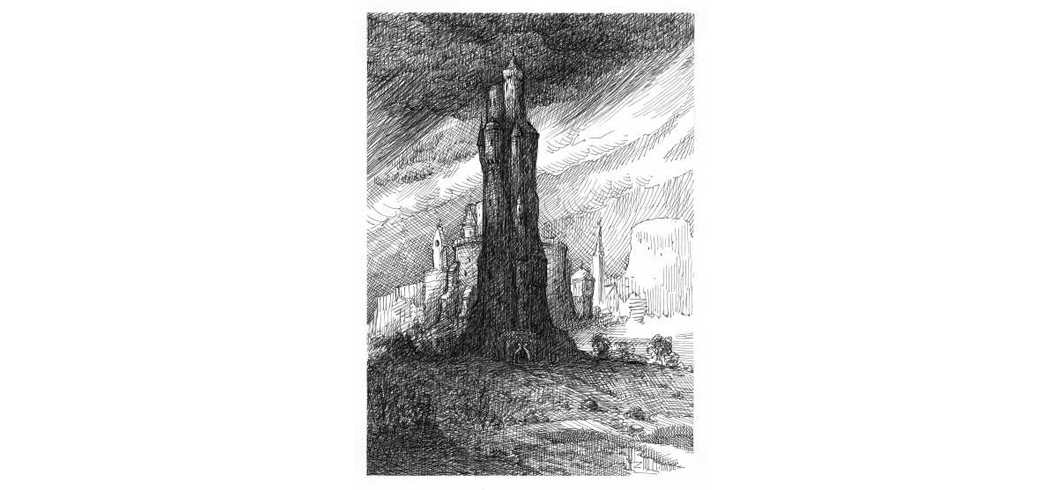
The world is a masquerade. Faces, costumes, voicesall pretend. We all wish to appear as we are not, we deceive ourselves, and in the end, we do not even recognize ourselves. - Francisco Jos de Goya y Lucientes, Los Caprichos(6)
The next treasure from my trove came from Francisco Goya, whose art I studied while living in Madrid 20 years ago.In college, I wrote (though never released) a mid-length work of interactive fiction in which the player visited a gallery of a pseudo-Goyas works and discovered he could (and indeed must) enter those works and engage in various adventures within them. The force Goya exerted on me has, if anything, grown over the intervening time. It is not just specific paintings (such as the famous image of Saturn devouring his child), but the overall mood and mentality of his work as a whole. The distillation is, for me,Los Caprichosa series of captioned etchings that convey the way in which supernatural horror springs from the everyday misery that is all around us. The characters of Strangelandare a blend of Gormenghasts eccentric weirdos and Los Caprichoss grotesque ordinary folk.
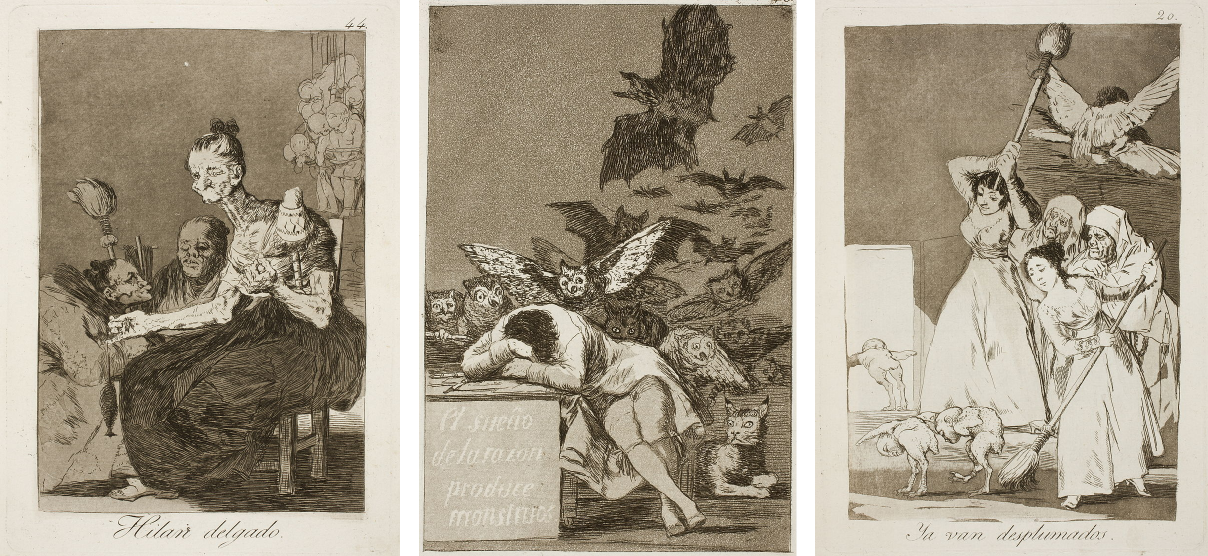
He expected me to stay with the family to mourn, but I got out of the car anyway and I ran down the hill toward the carnival. It didnt occur to me at the time, but I was running away from death, wasnt I? - Ray Bradbury, as interviewed in Mr. Electrico
Finally, when Victor suggested a carnival for the setting, my mind naturally turned to Ray Bradbury, the great humanist of science fiction, who came time and again to the theme of carnivals (most famously inSomething Wicked This Way Comes). With Bradbury, uncanniness and horror are used in service of a fundamental decency: to show us the humanity in what seems freakish and the freakish inhumanity that can fester inside anyone, no matter how outwardly conforming. That moral compass (albeit in the hands of a much less able navigator than Bradbury!) was something for me to use here, too.
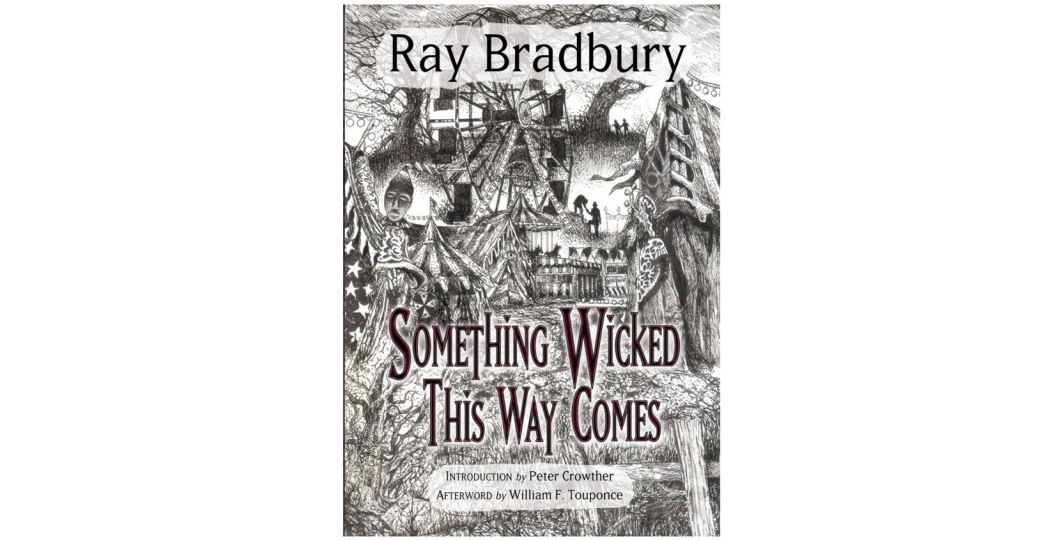
To be clear, these arent the only influences or even the main influences on Strangeland. We found inspiration in games like Sanitariumand Weird Dreams, shows and movies like The Prisoner and Eraserhead, religious and mythological works, etc. The work of creating Strangeland is weaving all these disparate strands into something that holds togetherand more important, is satisfying, fun, and fresh as a game.
The seed of Strangelandwas sadness, but it blossomed into hopes, among which is the hope that we will find a way to share the souvenirs the three of us have treasured from our own trips through life.
Ill end with a poem from my great-aunt, whose Inheritors was such an inspiration for Primordia. A lifelong beachcomber (literally and metaphorically), she describes a similar hope... that the collector might herself undergo a sea-change and yield a treasure for someone else to collect:
Last Will
Sea,skyandsand,
Remember me,
Beloved three,
Be kind to me;
I loved you defenselessly.
Eternal, primeval,
Holy trinity,
Wash, shriveanduse me,
Tenderly;
I was your creature when I was alive.
Master makers of jeweled toys,
Shape meandshine me into aseaprize
Found by a boys
Quick eyes in glad surprise.
Sea,skyandsand,
Let me one day
A small childs happy summer memory.
Minimum Setup
- OS: Ubuntu. Debian
- Processor: 2.7 GHz Dual Core (and above. can run on single core)Memory: 2 GB RAM
- Memory: 2 GB RAM
- Graphics: OpenGL. DirectX 5
- Storage: 2 GB available space
[ 6377 ]
[ 5871 ]
[ 751 ]
[ 2194 ]

